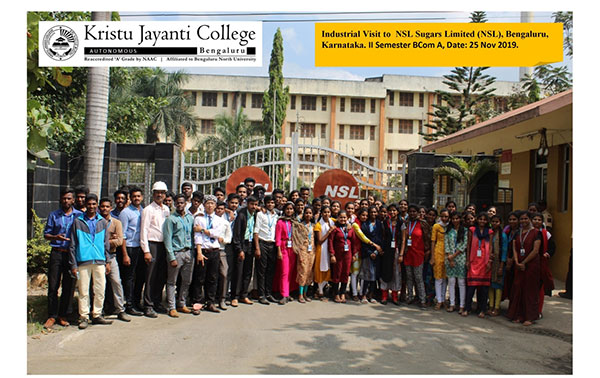
Industrial Vist
Industrial Visit Marigold Logistics Private Ltd. Hoskote, Bengaluru
Date:27 March 2025
On 27th March 2025, the students of IV B.Com, Section-H from Kristu Jayanti College embarked on an enlightening industrial visit to Marigold Logistics Private Ltd. Hoskote, Bengaluru.
The visit aimed to provide students with practical insights into the functioning of a prominent industrial establishment, enriching their academic knowledge and exposing them to real-world applications.
The students gained valuable insights into the logistics and supply chain industry during their visit to Marigold Logistics Pvt. Ltd. They learned about supply chain management, inventory control, and transportation processes, enhancing their understanding of logistics operations. Observing warehouse organization, material handling, and safety protocols provided practical exposure to warehouse management. Additionally, they explored technology in logistics by gaining exposure to software tools used for tracking shipments and inventory management. The visit also helped them understand industry best practices, including compliance, safety standards, and operational efficiency. Furthermore, interactions with professionals enabled them to develop essential skills such as teamwork, communication, and problem-solving. This hands-on experience bridged the gap between theoretical knowledge and real-world applications in the logistics sector.
In conclusion the students with practical industry exposure, bridging the gap between theoretical knowledge and real-world logistics applications.
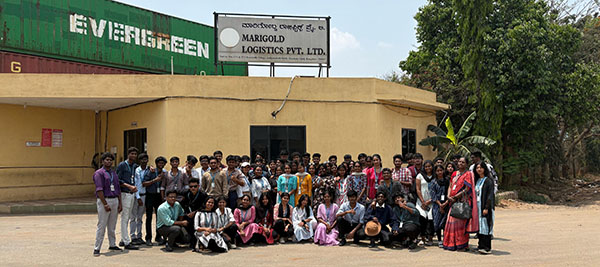
Industrial Visit Marigold Logistics Pvt. Ltd. Bengaluru
Date:26 March 2025
On 26th March 2025, the students of IV B.Com, Section-G from Kristu Jayanti College embarked on an insightful industrial visit to Marigold Logistics Pvt. Ltd. Bengaluru. The primary objective of the visit was to provide students with firsthand industry exposure in logistics and supply chain management. The visit aimed to help students understand the practical applications of their academic knowledge in a real-world business environment. The visit to Marigold Logistics Pvt. Ltd, Bengaluru, was an insightful experience for the students. It provided them with valuable knowledge about logistics operations and enhanced their understanding of industry practices. Such visits bridge the gap between academic learning and practical industry exposure, preparing students for future careers in logistics and supply chain management.
During the visit, students were given a comprehensive tour of the Marigold Logistics Pvt. Ltd., where they observed the office procedures, warehouse, and freight loading procedures. They gained firsthand experience in industrial operations, storage of various products in the warehouse, customs clearance information, cargo shipments etc. The team members of Marigold Logistics Pvt. Ltd. explained inbound and outbound logistics operations. Real-time tracking and fleet management techniques were discussed. Students engaged in a Q&A session with industry experts, gaining insights into career opportunities and challenges in logistics.
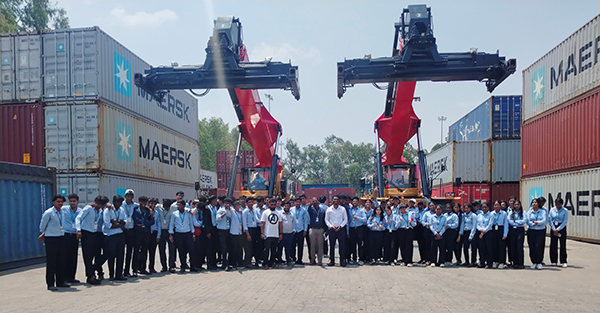
Industrial visit to KMF Mega Dairy, Hyderabad- Bangalore Highway, Chikkaballapur, Karnataka
Date:26 March 2025
In a bid to provide hands-on learning experiences to students and deepen their understanding of the dairy industry, the Department of Commerce (UG) at Kristu Jayanti College, Autonomous, organized an industrial visit to KMF Mega Dairy, Hyderabad- Bangalore Highway, Chikkaballapur, Karnataka. Upon arrival, the students were warmly welcomed by the management team of the milk producers' unit. The visit commenced with a comprehensive tour of the facility, where students observed the various stages of milk processing, from collection and pasteurization to packaging and distribution. They had the opportunity to witness modern equipment and technologies utilized in the production process, gaining valuable insights into industry best practices. Furthermore, interactive sessions were conducted by experts from the milk producers' union, who shared their expertise on topics such as quality control measures, dairy farming practices, and market dynamics. Students actively engaged in discussions, posing questions and seeking clarifications to enhance their understanding of the dairy industry's intricacies. The industrial visit proved to be a rewarding experience for the students, offering a blend of theoretical knowledge and practical exposure. It provided them with a deeper appreciation of the complexities involved in milk production and processing and the economic significance of the dairy sector in the region. Overall, the industrial visit was a testament to Kristu Jayanti College's commitment to providing holistic education and fostering experiential learning opportunities for its students.
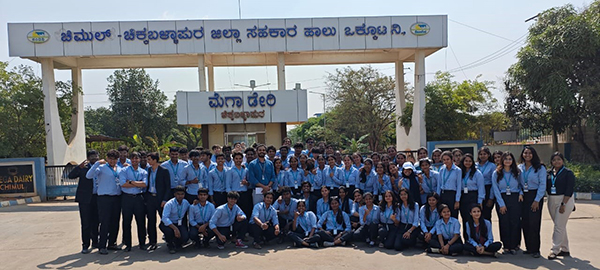
Experiential Learning: Industrial Visit to Milk Producers' Unit
Date:25 March 2025
In a bid to provide hands-on learning experiences to students and deepen their understanding of the dairy industry, the Department of Commerce (UG) at Kristu Jayanti College, Autonomous, organized an industrial visit to the KMF Mega Dairy, Chikkaballapur. Dr. Mathiyarasan M coordinated the visit to expose students to the practical aspects of milk production and processing.
On 25th March 2025, 74 students from the II Semester B.Com (A) class embarked on an educational excursion to the KMF Mega Dairy. Accompanied by faculty member, the students eagerly anticipated gaining first hand insights into the operations of a dairy facility.
Upon arrival, the students were warmly welcomed by the management team of the milk producers' unit. The visit commenced with a comprehensive tour of the facility, where students observed the various stages of milk processing, from collection and pasteurization to packaging and distribution. They had the opportunity to witness modern equipment and technologies utilized in the production process, gaining valuable insights into industry best practices. Furthermore, interactive sessions were conducted by experts from the milk producers' union, who shared their expertise on topics such as quality control measures, dairy farming practices, and market dynamics. Students actively engaged in discussions, posing questions and seeking clarifications to enhance their understanding of the dairy industry's intricacies.
The industrial visit proved to be a rewarding experience for the students, offering a blend of theoretical knowledge and practical exposure. It provided them with a deeper appreciation of the complexities involved in milk production and processing and the economic significance of the dairy sector in the region.
Dr. Mathiyarasan M, the faculty coordinator, expressed satisfaction with the student's enthusiasm and active participation throughout the visit. He emphasized the importance of experiential learning opportunities in complementing classroom teachings and preparing students for real-world challenges in their future careers.
Overall, the industrial visit to the KMF Mega Dairy was a testament to Kristu Jayanti College's commitment to providing holistic education and fostering experiential learning opportunities for its students.
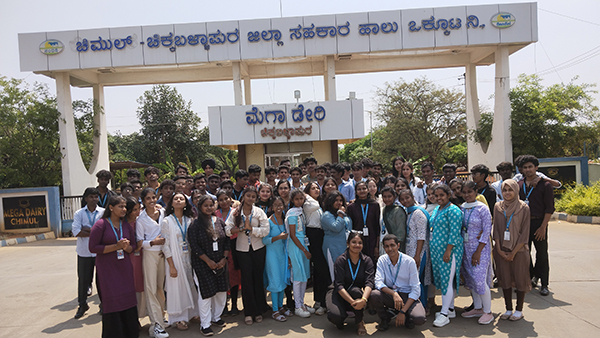
Industrial Visit to HMT Ltd. for IV B.Com. Section-D Students
Date:13 March 2025
On 13th March 2025, the students of IV B.Com. Section-D from Kristu Jayanti College undertook an insightful industrial visit to HMT Ltd. HMT staff led the students on a comprehensive tour of the factory, where they observed key manufacturing processes, including precision machining and assembly line operations. The students gained firsthand experience with industrial practices, noting the implementation of lean manufacturing principles and the rigorous quality checks conducted at each stage. They then explored the rich history of HMT watches at the HMT Watch Museum, witnessing an extensive collection of timepieces, such as vintage automatic watches, quartz watches, and specialized industrial timepieces. This visit provided a valuable learning experience, allowing students to connect their academic studies of supply chain management and operations strategies to real-world industrial practices. The students also participated in a question-and-answer session with HMT engineers.
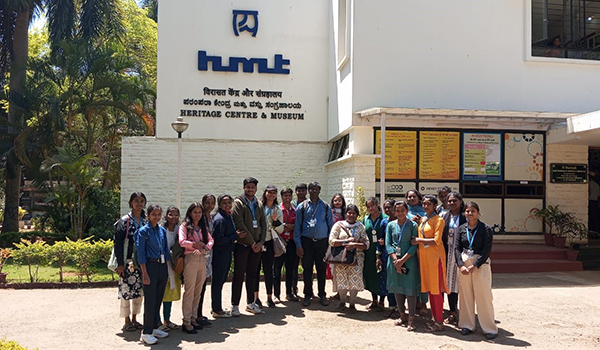
Industrial Visit - HMT Limited, Bengaluru
Date:13 March 2025
On March 13th, 2025, students from IV Sem B.Com (F), Department of Commerce (UG), Kristu Jayanti College, Autonomous, visited HMT Limited in Jalahalli, Bengaluru, as part of their Experiential Learning. The objective of this visit was to provide the students with practical exposure to the manufacturing industry and offer them firsthand insights into the functioning of a prominent industrial unit.
Upon arrival at HMT Limited, the Production Manager warmly greeted the students, who delivered an introductory presentation on the company's legacy, its evolution over the years, and its role in India's industrial development. He emphasized HMT's journey from being a leading watch manufacturer to diversifying into machine tools, tractors, and other engineering products.
Guided by the manager, the students were taken on a tour of the manufacturing and assembly units, where they observed the various stages of production. The visit began at the Machine Unit, where the students witnessed how advanced machinery is employed to manufacture precision parts and components.
Visit to HMT Heritage Centre and Museum
After the industrial visit, the students were taken to the HMT Heritage Centre and Museum, located within the HMT Colony, HMT Estate, Jalahalli. The museum was established to celebrate the legacy of Hindustan Machine Tools Limited (HMT), India's first machine manufacturing company, set up by the government in the late 1900s. The idea of establishing the museum arose after the closure of HMT's watch factory and other ancillary units, aiming to preserve and showcase the company's rich history.
The ground floor is dedicated to watchmaking history, tracing HMT's journey from manufacturing mechanical and quartz wristwatches to specialized models like Braille watches and flower clocks. One of the most fascinating exhibits is the 'Parts of a Watch' section, where the intricate components of various watches are meticulously displayed. The floor also showcases different dials, packaging boxes, and watchmaking tools.
The first floor archives the evolution of machine tools and equipment, presenting a timeline of HMT's milestones and a world map indicating international collaborations. The display also includes the development of HMT tractors, highlighting their mechanical parts and innovations over the years.
The trip to the HMT Limited and HMT Heritage Centre and Museum was a valuable and enriching experience for the IV B.com students of Kristu Jayanti College (Autonomous). The visit significantly enhanced the students' practical knowledge and gave them a holistic understanding of industrial operations and heritage preservation. The experience also motivated them to appreciate the legacy of Indian engineering and its contribution to the country's industrial growth.
This visit served as an informative and educational opportunity, offering the students a deeper understanding of the manufacturing sector and its intricate workings.
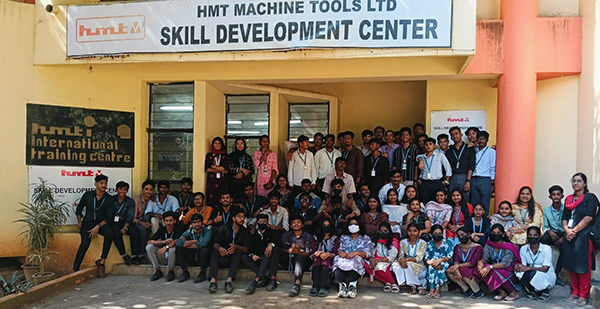
Industrial Visit - HMT Limited, Bengaluru
Date:12 March 2025
On 12th March 2025, the students of IV B.Com, Section-B from Kristu Jayanti College embarked on an insightful industrial visit to HMT Ltd. The visit aimed to provide them with practical exposure to the workings of a renowned industrial establishment, enhancing their academic learning through real-world applications. During the visit, students were given a comprehensive tour of the HMT factory, where they observed various stages of the manufacturing process. They gained firsthand experience of industrial operations, from raw material processing to final product assembly, offering valuable insights into production techniques, quality control, and overall manufacturing efficiency. Students explored the rich history of HMT watches at the HMT Watch Museum. The museum showcased the evolution of timekeeping technology and HMT’s legacy in watchmaking. They witnessed an extensive collection of timepieces, including vintage models and modern innovations, deepening their appreciation for the brand's contributions to the industry. The industrial visit proved to be a valuable learning experience for the students, providing them with practical knowledge and exposure to real-world industrial practices.
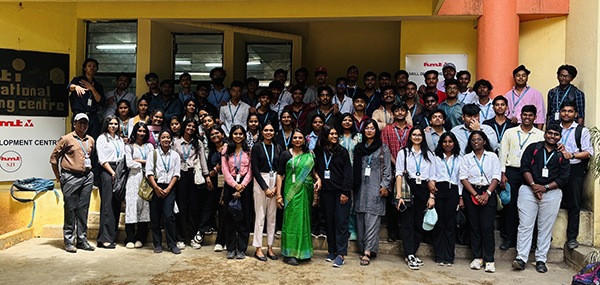
Visit to HMT
Date:12 March 2025
On March 12th, 2025, students from IV Sem B.Com A class, Department of Commerce (UG), Kristu Jayanti College, Autonomous, visited HMT Limited in Jalahalli, Bengaluru, as part of their Experiential Learning. The objective of this visit was to provide the students with practical exposure to the manufacturing industry and offer them firsthand insights into the functioning of a prominent industrial unit.
Upon arrival at HMT Limited, the Production Manager warmly greeted the students, who delivered an introductory presentation on the company's legacy, its evolution over the years, and its role in India's industrial development. He emphasized HMT's journey from being a leading watch manufacturer to diversifying into machine tools, tractors, and other engineering products.
Guided by the manager, the students were taken on a tour of the manufacturing and assembly units, where they observed the various stages of production. The visit began at the Machine Unit, where the students witnessed how advanced machinery is employed to manufacture precision parts and components. The next stop was the Assembly Unit, where various machine parts were systematically assembled to produce complete machines. The students understood how quality control measures are embedded at every stage of the assembly line to ensure high production standards.
Further, the group was escorted to the Research and Development (R & D) Department, where engineers and designers work on innovations and product improvements. The students learned about the importance of research and innovation in maintaining the company's competitive edge in the market.
The visit concluded with a Q & A session, where students eagerly interacted with the experts and clarified their doubts related to the manufacturing process and the challenges faced by the company in today's dynamic industrial environment.
Visit to HMT Heritage Centre and Museum
After the industrial visit, the students were taken to the HMT Heritage Centre and Museum, located within the HMT Colony, HMT Estate, Jalahalli. The museum was established to celebrate the legacy of Hindustan Machine Tools Limited (HMT), India's first machine manufacturing company, set up by the government in the late 1900s. The idea of establishing the museum arose after the closure of HMT's watch factory and other ancillary units, aiming to preserve and showcase the company's rich history.
The ground floor is dedicated to watchmaking history, tracing HMT's journey from manufacturing mechanical and quartz wristwatches to specialized models like Braille watches and flower clocks. One of the most fascinating exhibits is the 'Parts of a Watch' section, where the intricate components of various watches are meticulously displayed. The floor also showcases different dials, packaging boxes, and watchmaking tools.
The first floor archives the evolution of machine tools and equipment, presenting a timeline of HMT's milestones and a world map indicating international collaborations. The display also includes the development of HMT tractors, highlighting their mechanical parts and innovations over the years.
The industrial visit was organized under the guidance of Dr. Surjit Singha, the class mentor of IV Sem BCom (A), who accompanied the students throughout the visit. Dr. Singha emphasized the importance of experiential learning and encouraged students to actively engage with the industrial processes and the rich legacy of HMT. He highlighted how such visits bridge the gap between theoretical knowledge and practical applications, fostering a deeper understanding of industrial dynamics and heritage conservation.
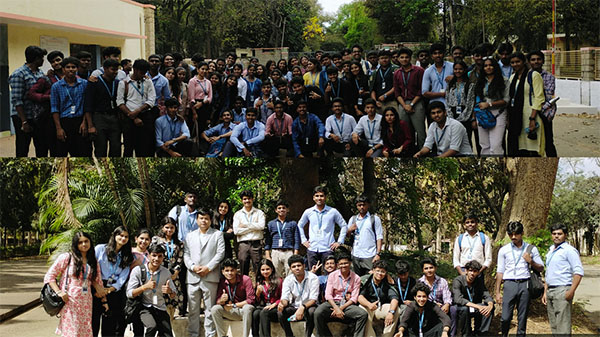
Visit to KMF Mega Diary, Chikkaballapura
Date:11 March 2025
An industrial visit to KMF Mega Dairy, Bangalore, was organized for the students of second semester B.Com C of Kristu Jayanti College on 11th March 2024. The visit aimed to provide students with practical insights into the functioning of a milk processing factory and the various stages involved in dairy production. KMF Mega Dairy, Bangalore, is one of the largest milk processing plants in Karnataka. It operates under the Karnataka Milk Federation (KMF) and processes thousands of liters of milk daily. The plant ensures high-quality milk and dairy products through advanced processing techniques and strict hygiene standards. The industrial visit to KMF Mega Dairy was a valuable experience for the students, offering them a first-hand understanding of the milk processing industry. The visit helped them relate their academic learning to real-world business operations, enhancing their knowledge of industrial processes and management techniques. The students found the visit informative and engaging, and it significantly contributed to their practical learning.
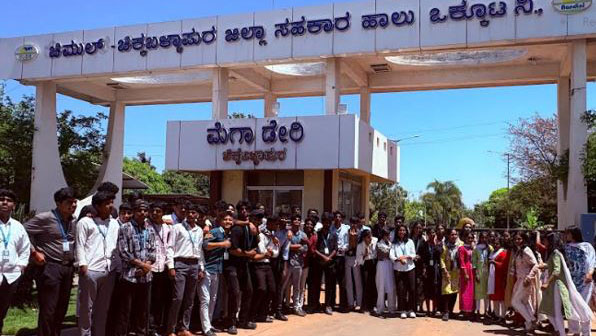
Visit to KMF Mega Diary, Chikkaballapura
Date:07 March 2025
On March 7th, 2024, students from Kristu Jayanti College Autonomous II B.com D class visited the Kolar District Co-Operative Milk Producer’s Societies’ Union Limited. in Chikkaballapura, Bengaluru, eager to explore the inner workings of the dairy industry firsthand. Upon arrival, they were warmly welcomed by the Production Manager, who provided a succinct overview of the dairy's history and operations.
Accompanied by the manager, the students toured the various departments of the dairy, gaining valuable insights at each stage. They began at the milk reception area, where rigorous quality testing ensured only the finest milk from local farmers was accepted. After passing through these quality checks, the milk was carefully weighed, measured, and stored in large tanks.
Moving on, the group visited the pasteurization zone, where the milk underwent heating to eliminate harmful bacteria, a crucial step in ensuring its safety for consumers. Following pasteurization, the milk went through homogenization, where its fat molecules were broken down to achieve a consistent, creamy texture.
The tour concluded with the students observing the meticulous packaging process, where the milk was packaged into containers of various sizes. Witnessing the operation of the packaging machinery provided them with insights into the diverse materials used in packaging.
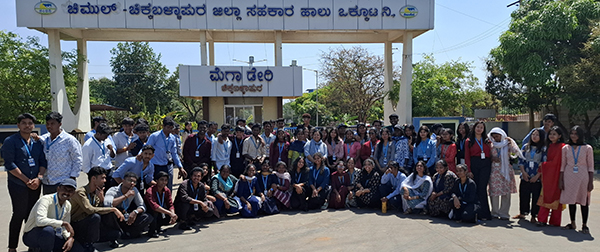
Industrial Visit to Stovekraft, Harohalli
Date:28 February 2025
The Department of Commerce at Kristu Jayanti College orchestrated an industrial excursion on 28th February 2025 for second-semester B.Com 'E' section students to Stovekraft Limited, situated in Harohalli along Kanakapura Road. Upon their arrival, the delegation was cordially received by representatives from the Human Resource Department, who subsequently facilitated an extensive tour of the facility, providing insights into its multifaceted manufacturing processes.
During this immersive visit, students were granted privileged access to the intricate production lines of cookers, stoves, and microwave ovens. Each section's supervisors meticulously delineated the operational methodologies, elucidating the nuanced mechanisms underpinning their respective manufacturing units. Furthermore, students garnered invaluable exposure to critical industrial dynamics, encompassing material handling, interim storage protocols, and the precise orchestration of finished goods transit to designated warehouses.
An interactive discourse ensued, wherein students actively engaged in intellectual inquiry, seeking elucidation on various facets of the production cycle. Notably, they probed into the enterprise’s waste management paradigms, recycling methodologies, and the intricate anodizing process. This experiential learning endeavor afforded them a tangible comprehension of large-scale manufacturing operations, augmenting their academic proficiency with pragmatic industrial acumen.
Stovekraft Limited, a renowned entity in the consumer durables sector, is esteemed for its flagship brands, Pigeon and Gilma. The organization exemplifies operational excellence through its meticulously structured processes and robust supply chain frameworks. The second-semester B.Com Logistics and Supply Chain cohort benefitted immensely from this exposure, refining their theoretical understanding through direct observation of real-world industrial practices.
The expedition commenced at 7:00 AM from the college premises under the supervision of their faculty mentor and culminated with their return to campus at 3:00 PM, marking a day of profound academic enrichment and industry-oriented learning.
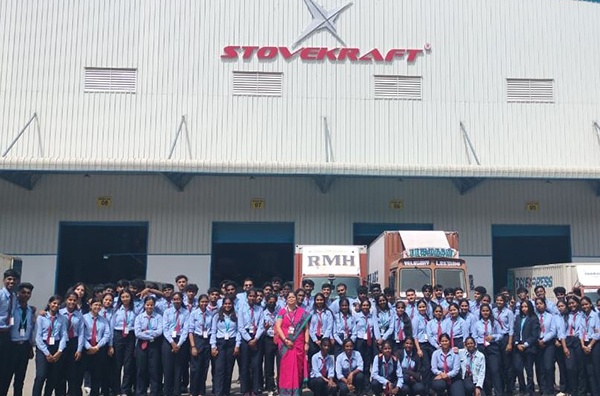
Industrial Visit to MYMUL Mysuru Milk Union Limited
Date:25 February 2025
On February 25, 2025, students from Kristu Jayanti College's VI B.com B, D, E & F class paid a visit to MYMUL Mysuru Milk Union Limited, also known as KMF, Mysuru. After extending a kind welcome, the production manager gave them a quick overview of the history and current situation of the dairy. The students were eager to find out more about the inner workings of the dairy industry. The manager went with the students to all of the dairy's departments, where they learned a lot. Through rigorous quality testing, they ensured that only the best milk from neighboring farms was permitted, starting at the milk reception center. After these quality checks, the milk was carefully weighed, measured, and stored in large tanks. After that, the group went to the pasteurization zone, where the milk was heated to eliminate harmful bacteria—a crucial step in ensuring the safety of the patrons. Following pasteurization, the milk was homogenized, resulting in a consistently creamy sensation due to the breakdown of its fat molecules. The children observed the milk being meticulously packed into various-sized containers as the trip came to a close.
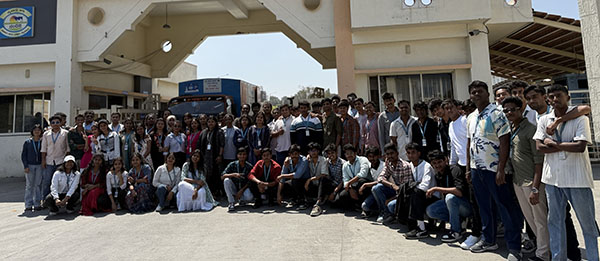
Industrial Visit to MYMUL Mysuru Milk Union Limited - KMF, Mysuru
Date:24 February 2025
Students of VI B.com H class, Kristu Jayanti College visited MYMUL Mysuru Milk Union Limited – KMF, Mysuru on February 24, 2025. The Production Manager greeted them warmly and gave them a brief rundown of the dairy's background and current state of affairs. The pupils couldn't wait to learn more about the inner workings of the dairy business. The manager accompanied the pupils as they visited the dairy's many departments, learning a lot at each stop. Starting at the milk reception area, they made sure that only the best milk from nearby farms was admitted through stringent quality testing. Following these quality inspections, the milk was meticulously measured, weighed, and kept in huge tanks. The group then traveled to the pasteurization zone, where the milk was heated to get rid of dangerous bacteria—a critical step in guaranteeing customer safety. The milk underwent homogenization after pasteurization, where the breakdown of its fat molecules produced a uniformly creamy mouthfeel. As the tour came to an end, the kids watched as the milk was carefully packaged into different-sized containers. They gained knowledge of the various materials used in packing by watching the packaging equipment in action.
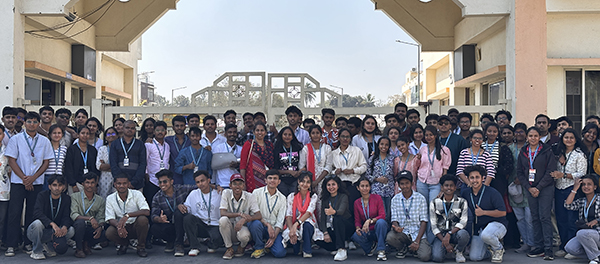
Industrial Visit to Harohalli Industrial Area, Kanakapura
Date:21 February 2025
On 21st February 2025, 54 students from the B.Com G BPM (2024-2027 Batch) visited Harohalli Industrial Area,Kanakapura Taluk, organized by the Department of Commerce (UG), Kristu Jayanti College. The visit provided students with hands-on experience of the manufacturing processes of kitchen appliances, including design, production, and quality control. They learned about employee safety protocols, automation in manufacturing, and the use of advanced technologies in production. The students also gained insights into the importance of efficiency and precision in industrial operations. This visit offered valuable insights into the practical aspects of industrial operations, helping students connect theoretical knowledge with real-world applications in the manufacturing sector.
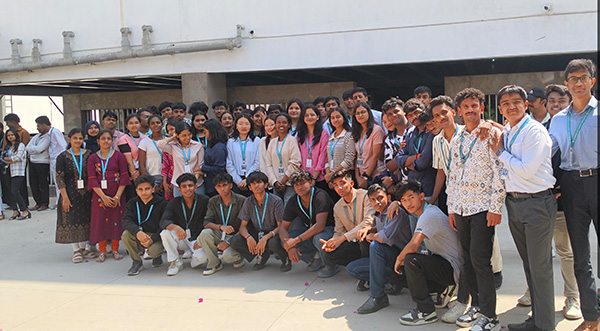
Industrial Visit to Stovekraft, Harohalli
Date:22 February 2025
Department of Commerce, Kristu Jayanti College organised an industrial visit visit on 22nd February 2025 for B. Com Second Semester 'F' section students to Stove Craft Limited Harohalli, Kanakapura Road.'
Upon reaching the plant, the students were welcomed by the officials of the human resource department, and they were guided through the plant. Students got an opportunity to visit manufacturing units of cooker, stove and microwave oven. The respective section supervisors explained the processes of their units. In addition to that, students have experienced the process, material handling, storage of work in progress, and the timely transfer of finished goods to the warehouses. Student were also provided an opportunity to clarify their doubt regarding the manufacturing process. Some students have asked about the recycling process and the kinds of waste generated. Also, the students were inquisitive about the anodizing process. They had practical exposure and better clarity on the processing and functioning of a manufacturing plant.
Stove Craft Limited produces well-established brands such as Pigeon and Gilma and they have an excellent system and process, which second-semester B. Com Logistics and Supply Chain students had the opportunity to experience during their industrial visit 2025. Saturday at 7.15 AM the team started the trip to Kanakapura with their class teacher and returned to the campus by 3.30.
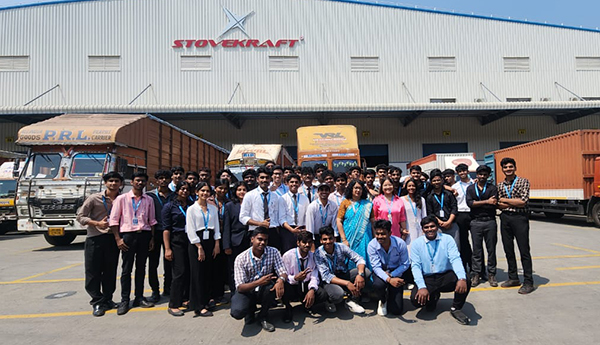
Industrial Visit to Stovekraft Limited, Horohalli, Industrial Area, Kanakapura Taluk, Bengluru
Date:21 February 2025
The Department of Commerce (UG), Kristu Jayanti College, organized an industrial visit for B.Com 1st Year H section students to Stovekraft Limited, located in Harohalli Industrial Area, Kanakapura Taluk, Bengaluru, on 21st February 2025, as part of their experiential learning initiative. The visit aimed to provide students with practical exposure to manufacturing processes, operational strategies, and industrial work environments, complementing their academic curriculum with real-world insights. Upon arrival, students were welcomed by the company’s representatives, who provided an overview of Stovekraft Limited, a leading manufacturer of kitchen appliances known for brands like Pigeon and Gilma. The session began with an informative presentation detailing the company’s history, product portfolio, market reach, and commitment to innovation and sustainability. Students were then guided through various production units, where they observed manufacturing operations, assembly lines, quality control mechanisms, and packaging processes, gaining firsthand knowledge of supply chain management and industrial efficiency. The visit also included interactions with company executives and production managers, who shared valuable insights into industry trends, challenges, and career opportunities in the manufacturing sector. The interactive session allowed students to clarify doubts and understand key aspects of business operations, such as inventory management, automation, and workforce coordination. Additionally, the students witnessed the implementation of safety protocols and environmental sustainability measures adopted by the company, emphasizing corporate social responsibility in industrial practices. The visit successfully bridged the gap between theoretical concepts and practical applications, enhancing students’ understanding of business operations, entrepreneurship, and industrial dynamics. The faculty coordinators and students expressed their gratitude to Stovekraft Limited for the enriching learning experience, which will significantly contribute to their academic and professional growth.
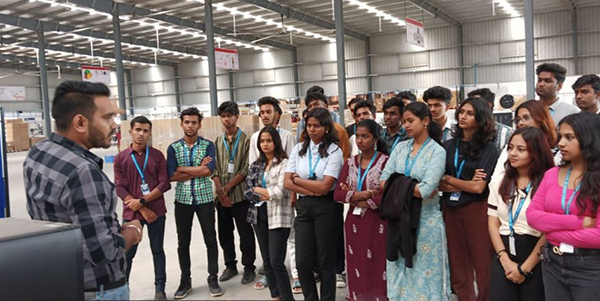
Industrial Visit to Mysore District Co-Operative Milk Producer’s Societies’ Union Limited
Date:20 February 2025
Students of VI B.com B and A section, Kristu Jayanti College visited Mysore District Co-Operative Milk Producer’s Societies’ Union Limited in Mysore on February 20, 2025. Upon arrival, they were warmly welcomed by the Production Manager, who provided a succinct overview of the dairy’s history and operations. The students were eager to explore the inner workings of the dairy industry. Accompanied by the manager, the students toured the various departments of the dairy, gaining valuable insights at each stage. They began at the milk reception area where rigorous quality testing ensured only the finest milk from local farmers was accepted. After passing through these quality checks, the milk was carefully weighed, measured, and stored in large tanks. Moving on, the group visited the pasteurization zone, where the milk underwent heating to eliminate harmful bacteria, a crucial step in ensuring its safety for consumers. Following pasteurization, the milk went through homogenization, where its fat molecules were broken down to achieve a consistent, creamy texture. The tour concluded with the students observing the meticulous packaging process, where the milk was packaged into containers of various sizes. Witnessing the operation of the packaging machinery provided them with insights into the diverse materials used in packaging.
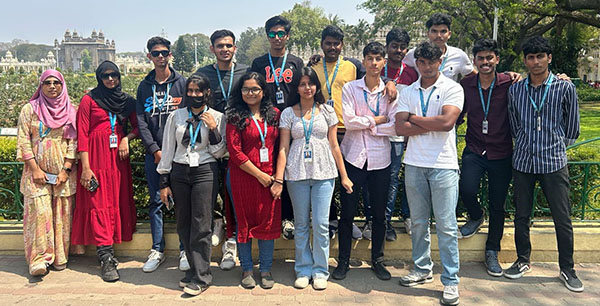
Field Visit to Belur, Halebidu, and Shravanabelagola
Date:12 November 2024
The field visit to Belur, Halebidu, and Shravanabelagola, conducted on 12th November 2024 with the III Semester B.Com Tourism students, provided a comprehensive learning experience focused on Karnataka's rich historical and cultural heritage. The primary objective of this visit was to offer students direct exposure to heritage and pilgrimage tourism.with a particular emphasis on understanding the architectural, religious, and cultural significance of these renowned sites. At Belur, students explored the Chennakesava Temple, a masterpiece of Hoysala architecture, known for its finely detailed stone carvings depicting mythological narratives, local art forms, and regional flora and fauna. This experience helped students grasp the intricate craftsmanship and historical importance of Hoysala temples, providing insights into the cultural legacy that shapes Karnataka’s tourism appeal. The visit to Halebidu, the former capital of the Hoysala Empire, allowed students to witness the Hoysaleswara Temple's architectural complexity. With its dual shrines and elaborate sculptures, the temple illustrated the unique characteristics of Hoysala design. Discussions at Halebidu covered the challenges and strategies involved in preserving such historical sites and the role of tourism in their conservation. At Shravanabelagola, students ascended to the site of the Bahubali statue, a significant Jain pilgrimage destination. This visit underscored the importance of pilgrimage tourism and provided students with an understanding of the cultural and spiritual dimensions that attract pilgrims from across the world. The panoramic view and religious atmosphere enhanced students' appreciation of the site’s value to Jain heritage and the broader implications for tourism.
In conclusion, this field visit significantly enriched the students’ theoretical knowledge with practical insights into heritage site management, conservation efforts, and the socio-cultural impact of tourism. By bridging classroom learning with real-world experiences, the visit fostered a deeper understanding of tourism's role in promoting and preserving Karnataka's historical landmarks.
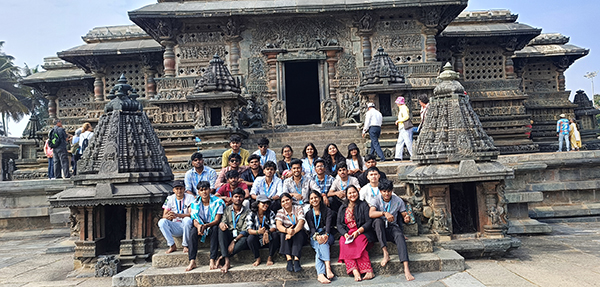
Industrial Visit to National Institute of Prakrit Study Center in Hassan District
Date:26 March 2024
The Department of Commerce (PG) organized Industrial Visit program, with the objective to make the students understand about Research Practices followed by the Institute and Learn about Preservation of Manuscripts and its History. The students of II Semester M. Com and M. Com FA visited National Institute of Prakrit Study Center in Hassan District on 26/03/2024. A total of 90 students actively participated in this program. During the visit, students had a unique opportunity to engage with scholars dedicated to preserving ancient manuscripts, some dating back to the 7th century, and explore the library's collection, including books available for sale. This visit provided an enriching experience, igniting curiosity among the students. They learned about the significance of preserving knowledge and gained insights into the history surrounding the magnificent Gomateshwara statue and Jain temples in Shravanabelagola. Additionally, they were briefed about languages like Sanskrit and Prakrit, deepening their understanding of cultural heritage, housing a diverse range of manuscripts in various languages, contributing to the preservation and dissemination of Jain heritage.
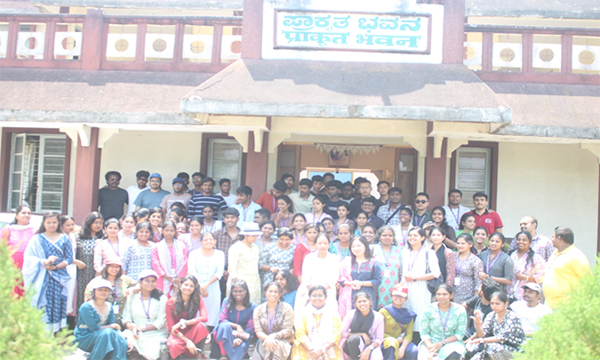
Industrial Visit to Mysore District Co-Operative Milk Producer’s Societies’
Date:13 March 2024
Students of VI B.com E class, Kristu Jayanti College visited Mysore District Co-Operative Milk Producer’s Societies’Union Limited in Mysore on March 13, 2024. Upon arrival, they were warmly welcomed by the Production Manager, who provided a succinct overview of the dairy’s history and operations. The students were eager to explore the inner workings of the dairy industry. Accompanied by the manager, the students toured the various departments of the dairy, gaining valuable insights at each stage. They began at the milk reception area where rigorous quality testing ensured only the finest milk from local farmers was accepted. After passing through these quality checks, the milk was carefully weighed, measured, and stored in large tanks. Moving on, the group visited the pasteurization zone, where the milk underwent heating to eliminate harmful bacteria, a crucial step in ensuring its safety for consumers. Following pasteurization, the milk went through homogenization, where its fat molecules were broken down to achieve a consistent, creamy texture. The tour concluded with the students observing the meticulous packaging process, where the milk was packaged into containers of various sizes. Witnessing the operation of the packaging machinery provided them with insights into the diverse materials used in packaging.
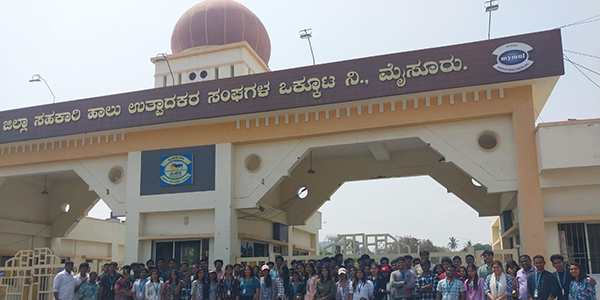
Industrial Visit to The Mysore District Co-operative Milk Producers’ Societies
Date: 12 March 2024
On 12th March 2024, the students of VI B.Com, Section-F from Kristu Jayanti College embarked on an enlightening industrial visit to The Mysore District Co-operative Milk Producers’ Societies Union Limited. The visit aimed to provide students with practical insights into the functioning of a prominent industrial establishment, enriching their academic knowledge and exposing them to real-world applications.
The students were taken on a comprehensive tour to The Mysore District Co-operative Milk Producers’ Societies Union factory, where they witnessed the various stages of manufacturing processes. They gained firsthand experience of how industrial operations are carried out, from raw material processing to the final product assembly. The visit offered valuable insights into the intricacies of production, quality control, and the overall functioning of a manufacturing unit.
The students had the opportunity to explore the rich history of The Mysore District Co-operative Milk Producers’ Societies Union.
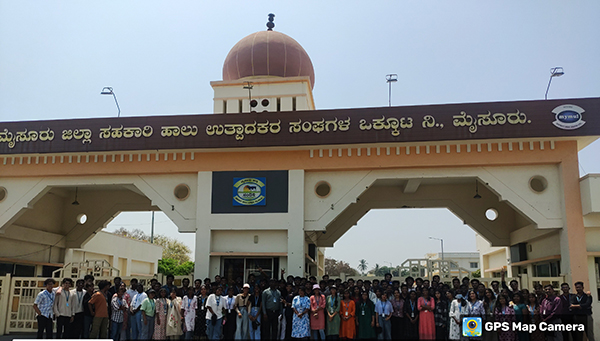
Industrial visit to KMF DIARY, KUDIGE, KUSHALNAGAR
Date: 08 March 2024
On 8th Mar 2024, the students of VI B.Com, Section-B from Kristu Jayanti College embarked on an enlightening industrial visit to KMF DIARY, KUDIGE, KUSHALNAGAR, SOMWARPETE TQ., COORG DIST.,.. The visit aimed to provide students with practical insights into the functioning of a prominent industrial establishment, enriching their academic knowledge and exposing them to real-world applications.
The students were taken on a comprehensive tour of the KMF DIARY, where they witnessed the various stages of manufacturing processes. They gained firsthand experience of how industrial operations are carried out, from raw material processing to the final product assembly. The visit offered valuable insights into the intricacies of production, quality control, and the overall functioning of a manufacturing unit.
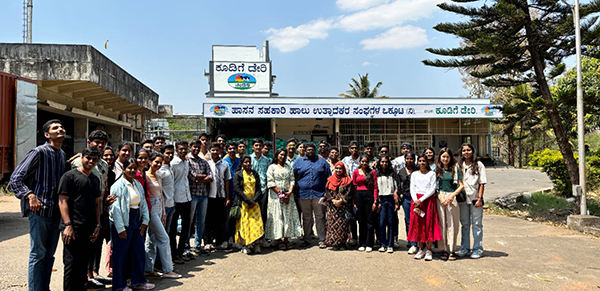
Industrial visit to Nandini Milk Factory
Date: 01 March 2024
On 01th March 2024, the students of VI B.Com, Section-A from Kristu Jayanti College embarked on an enlightening industrial visit to Nandini Milk Factory, Croog.
The visit aimed to provide students with practical insights into the functioning of a prominent industrial establishment, enriching their academic knowledge and exposing them to real-world applications.
The students were taken on a comprehensive tour to Nandini Milk Factory, where they witnessed the various stages of manufacturing processes. They gained firsthand experience of how industrial operations are carried out, from raw material processing to the final product assembly. The visit offered valuable insights into the intricacies of production, quality control, and the overall functioning of a manufacturing unit.
The students had the opportunity to explore the rich history Nandini Milk Factory.
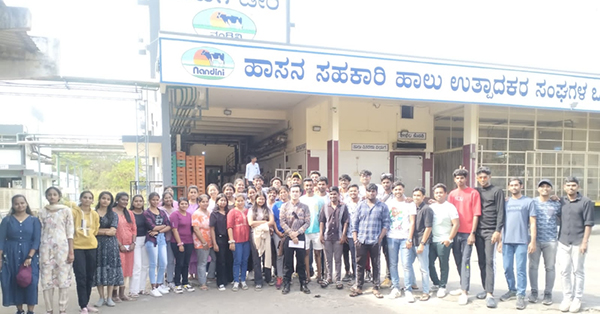
Field Trip to Belur, Halebidu and Shravanabelagola
Date: 29 February 2024
A field trip was organized by the Department of Commerce (UG) in association with the Tourism Club, Kristu Jayanti College Autonomous on 29th February 2024 for the students of VI Semester B.COM Tourism. The field trip covered the UNESCO World Heritage site Hoysala Temples of Belur & Halebidu and the Jain pilgrimage Centre Shravanabelagola. The most noteworthy feature of the magnificent temples at Belur and Halebidu is that they showcase the distinct Hoysala architecture in all its glory; perfectly preserved for over a thousand years. Shravanabelagola is home to the 18 m high statue of Lord Gometeshwara and is considered to be one of the world’s tallest free-standing monolithic statues. The field trip inspired students to preserve and promote cultural heritage by raising awareness about the importance of heritage conservation, sustainable tourism, and community involvement.
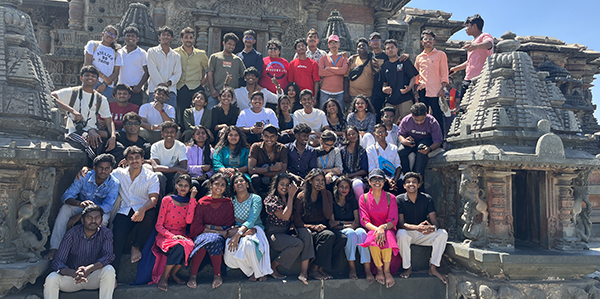
Industrial Visit Karnataka Cooperative Milk Producers Federation Ltd. (KMF) Chikkaballapur (B.Com ‘F’)
Date: 21 February 2024
On February 21st - 2024, the students of II B.Com F at Kristu Jayanti College embarked on an informative industrial visit to Karnataka Cooperative Milk Producers Federation Ltd. (KMF) Chikkaballapur. The visit exactly started by 10.30 AM and ended by 12.30 PM. Along with the visual learning, an employee (Mr.Suresh) from the organization side briefed to students about the process in the production of various products at regular intervals. We completed the Industrial visits successfully and returned to the college at 3.00 pm.
During the visit, The Milk Producers' Societies' facility, helped students better understand practical applications by showcasing cutting-edge equipment and technology used in the manufacture of machine tools. The visit promoted a comprehensive learning experience by creating a link between academic knowledge and real-world application. Further, students gained the knowledge on several industrial testing procedures, such as cooling, heating, quality measurement and control, and packaging, etc. The students' academic foundation will surely be strengthened and they will be better prepared for future endeavors in the field by being exposed to The Kolar District Co-Operative Milk Producers' Societies' Union Limited’s operations.
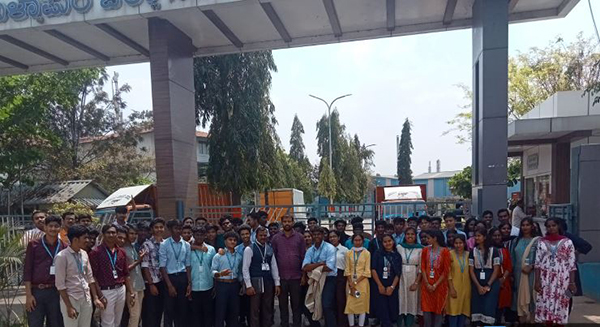
Experiential Learning: Industrial Visit to KOMUL, Kolar
Date: 28 February 2024
The Department of Commerce (UG), Kristu Jayanti College (Autonomous), has organized an Industrial Visit to the Kolar District Co-Operative Milk Producer's Societies' Union Limited in Huthur post, Kolar on 28th February 2024. KOMUL is the second-highest milk-producing district organization in Karnataka.
On 28th February 2024, Dr. Priyanka Ghosh coordinated with 71 students from II B.Com H and visited KOMUL to experience milk processing. The journey began on the college campus, and the students were welcomed after reaching the management. Mr. Vinod from KOMUL explained each step of milk processing to the students. The students have learned about quality control measures and other essential aspects of KOMUL.
Overall, the industrial visit to The Kolar District Co-operative Milk Producers' Societies' Union Limited was a testament to Kristu Jayanti College's commitment to providing holistic education and fostering experiential learning opportunities for its students.
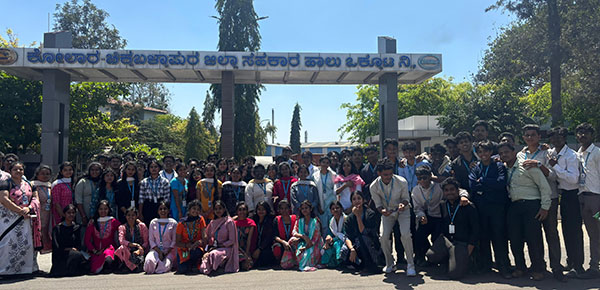
Chikkaballapura District Co-operative Milk Producers Union Ltd.
Date: 27 February 2024
On February 27th, 2024, the Department of Commerce (UG), Kristu Jayanti College (Autonomous), Bengaluru, organized an industrial visit for 69 I BCOM G students to the Chikkaballapura District Co-operative Milk Producers Union Ltd. Kolar Dairy Premises, NH 75, Huthur post, Kolar- 563102. Students have the chance to explore about Milk Production, working techniques, and employment procedures at the Plant. Students received a thorough introduction to the business and were shown the milk treatment plant's treatment and purification processes and production of different milk products. The employees of dairy instructed the students on employee safety guidelines and safeguards. The students learned via experience as a result of the productive industrial tour.
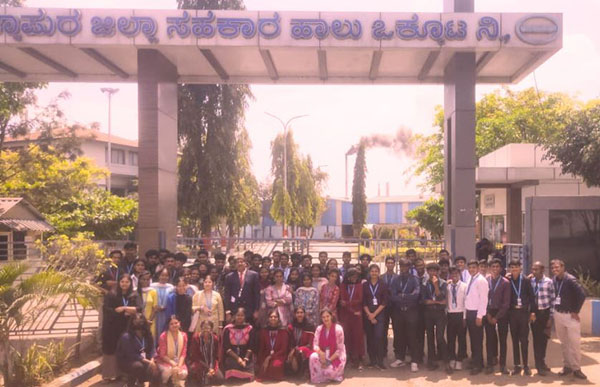
Experiential Learning: Industrial Visit to Milk Producers' Unit
Date: 20 February 2024
In a bid to provide hands-on learning experiences to students and deepen their understanding of the dairy industry, the Department of Commerce (UG) at Kristu Jayanti College, Autonomous, organized an industrial visit to The Kolar District Co-operative Milk Producers' Societies' Union Limited. Dr. Surjit Singha coordinated the visit to expose students to the practical aspects of milk production and processing.
On 20th February 2024, 65 students from the II Semester BCom (E) class embarked on an educational excursion to the Huthur Post, Kolar milk production unit. Accompanied by faculty members, the students eagerly anticipated gaining firsthand insights into the operations of a dairy facility.
Upon arrival, the students were warmly welcomed by the management team of the milk producers' unit. The visit commenced with a comprehensive tour of the facility, where students observed the various stages of milk processing, from collection and pasteurization to packaging and distribution. They had the opportunity to witness modern equipment and technologies utilized in the production process, gaining valuable insights into industry best practices.
Furthermore, interactive sessions were conducted by experts from the milk producers' union, who shared their expertise on topics such as quality control measures, dairy farming practices, and market dynamics. Students actively engaged in discussions, posing questions and seeking clarifications to enhance their understanding of the dairy industry's intricacies.
The industrial visit proved to be a rewarding experience for the students, offering a blend of theoretical knowledge and practical exposure. It provided them with a deeper appreciation of the complexities involved in milk production and processing and the economic significance of the dairy sector in the region.
Dr. Surjit Singha, the faculty coordinator, expressed satisfaction with the student's enthusiasm and active participation throughout the visit. He emphasized the importance of experiential learning opportunities in complementing classroom teachings and preparing students for real-world challenges in their future careers.
Overall, the industrial visit to The Kolar District Co-operative Milk Producers' Societies' Union Limited was a testament to Kristu Jayanti College's commitment to providing holistic education and fostering experiential learning opportunities for its students.

Industrial Visit to Chikkaballapura District Co-operative Milk Producers Union Ltd(KOMU)
Date: 14 February 2024
On February 14th, 2024, students from the II B.com class at Kristu Jayanti College Autonomous embarked on a visit to the Chikkaballapura District Co-operative Milk Producers Union Ltd. situated in Kolar, Bengaluru. Their objective was to delve into the workings of the dairy industry and witness firsthand the intricate procedures of milk production and packaging.
Upon their arrival, the Production Manager graciously greeted the group and delivered a concise overview of the dairy's background. Leading the students through the dairy's departments, the manager elucidated the intricacies of each stage. Beginning at the milk reception area, where milk from various farmers undergoes rigorous quality testing, the manager stressed the dairy's commitment to accepting only the highest quality milk. Following testing, the milk is meticulously weighed, measured, and stored in sizable tanks.
Continuing the visit, the group ventured to the pasteurization zone, where the milk undergoes heating to eradicate harmful bacteria, a critical step in ensuring its safety for consumption. Subsequently, in the homogenization phase, the milk's fat molecules are broken down to achieve uniform distribution, resulting in a creamy and smooth consistency.
Concluding the process, the students observed the meticulous packaging of the milk into containers of various sizes. Witnessing the operation of the packaging machinery, they gained insight into the diverse materials utilized in packaging.
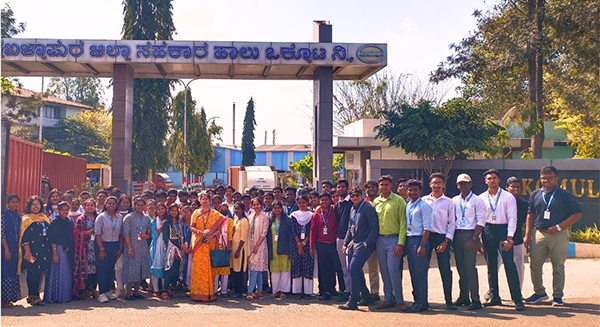
Industrial Visit to KOMUL Chikkaballapura District Co-operative Milk Producers Union Ltd Kolar, Karnataka
Date: 13 February 2024
Students from second-semester B.Com (T) visited KOMUL Chikkaballapura District Co-operative Milk Producers Union Ltd Kolar, Karnataka, as a part of their experiential learning. The Department of Commerce (UG) organized the industrial visit on 13 Feb 2024. KOMUL is the second-highest milk-producing district organization in Karnataka. Kolar Dairy supplies various products under the Nandini "Good-Life" brand name. Twenty-five students from B.COM Tourism visited the factory, and they could understand the processing of milk and functioning of the factory under different sections. One supervisor from KOMUL was guiding the students throughout their visit.
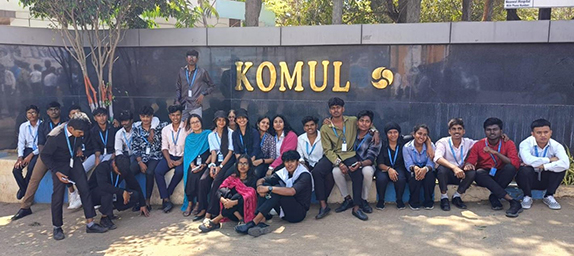
Industrial Visit to KOMUL Chikkaballapura District Co-operative Milk Producers Union Ltd Kolar, Karnataka (B.Com II B Sec)
Date: 07 February 2024
On February 07- 2024, the students of II B.Com B at Kristu Jayanti College embarked on an informative industrial visit to Karnataka Cooperative Milk Producers Federation Ltd. (KMF) Chikkaballapur. This visit aimed to offer practical insights into the operations of a prominent industrial establishment, enhancing the students' academic knowledge and exposing them to real-world applications.
During the visit, the students were guided through a comprehensive tour of the KMF factory, where they observed various stages of the manufacturing processes. This hands-on experience provided them with a firsthand understanding of industrial operations, spanning from raw material processing to the assembly of the final product. The visit proved instrumental in imparting valuable insights into production intricacies, quality control measures, and the overall functioning of the manufacturing unit.
Students are also exposed to the warehousing and logistics sections, so that they can have an understanding regarding the overall supply chain system in the enterprise. The visit exactly started by 10.30 AM and ended by 12.30 PM. Along with the visual learning, an employee from the organization side briefed about the process to the students. We completed the Industrial visits by 1 ‘O clock and after the lunch came back to college.
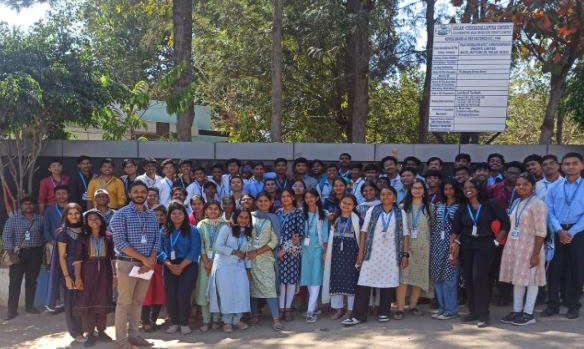
Industrial Visit to KOMUL Chikkaballapura District Co-operative Milk Producers Union Ltd Kolar, Karnataka
Date: 06 February 2024
Students from second-semester B.Com (A) visited KOMUL Chikkaballapura District Co-operative Milk Producers Union Ltd Kolar, Karnataka, as a part of their experiential learning. The Department of Commerce (UG) organized the industrial visit on 06th Feb 2024. KOMUL is the second-highest milk-producing district organization in Karnataka. Kolar Dairy supplies various products under the Nandini "Good-Life" brand name. Sixty nine students from B.COM A section visited the factory, and they could understand the processing of milk and functioning of the factory under different sections. One supervisor from KOMUL was guiding the students throughout their visit.
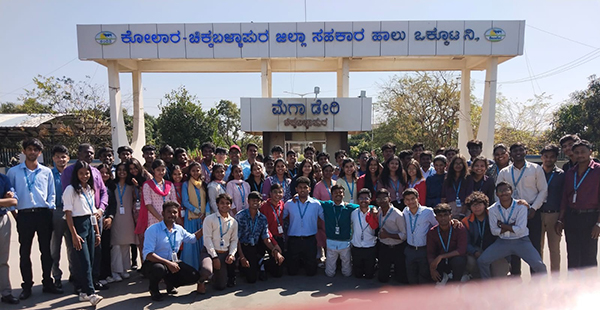
Industrial Visit to HMT Machine Tools Ltd., HMT Estate, Jalahalli, Bengaluru
Date: 19 January 2024
On 19th Jan 2024, the students of IV B.Com, Section-E from Kristu Jayanti College embarked on an enlightening industrial visit to HMT Ltd. The visit aimed to provide students with practical insights into the functioning of a prominent industrial establishment, enriching their academic knowledge and exposing them to real-world applications.
The students were taken on a comprehensive tour of the HMT factory, where they witnessed the various stages of manufacturing processes. They gained firsthand experience of how industrial operations are carried out, from raw material processing to the final product assembly. The visit offered valuable insights into the intricacies of production, quality control, and the overall functioning of a manufacturing unit.
The students had the opportunity to explore the rich history of HMT watches at the MHT Watch Museum. The museum showcased the evolution of timekeeping technology and the remarkable journey of HMT in the watchmaking industry. Students were able to witness a diverse collection of timepieces, including vintage models and modern innovations, which contributed to their understanding of the brand's legacy.
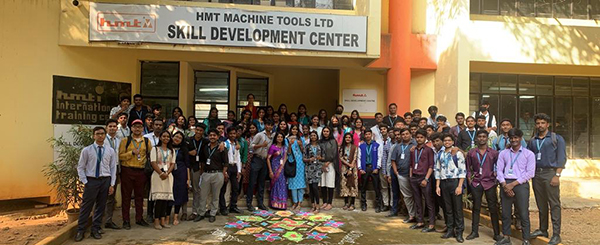
Industrial Visit at Chikkaballapura District Co-operative Milk Producers Union Ltd
Date: 28 February 2023
On February 28th, 2023, the Department of Commerce (UG), Kristu Jayanti College (Autonomous), Bengaluru, organized an industrial visit for I BCOM B students. Seventy-two students were taken to the Chikkaballapura District Co-operative Milk Producers Union Ltd., Kolar Dairy Premises, NH 75, Huthur post, Kolar- 563102. The students had the chance to explore the production of milk, working techniques, and the employment procedures at the Plant. Students received thorough information about the business and were shown the milk procurement, purification, and also production processes of different milk products. The employees of the Plant instructed the students about the employees’ safety guidelines and safeguards. The students learned via experience as a result of the productive industrial tour.
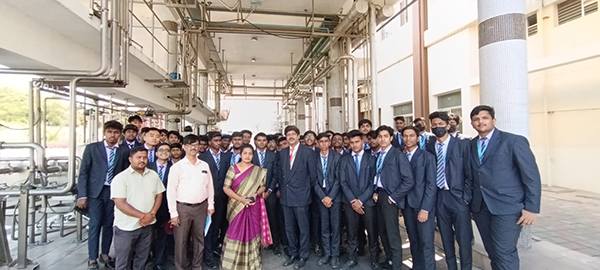
Industrial Visit at BWSSB, TK Halli, Karnataka (III B.Com Sec E)
Date: 07 November 2022
The Department of Commerce (UG), Kristu Jayanti College (Autonomous), Bengaluru gas organized an Industrial Visit for III Sem B.Com students on 7th November, 2022 at BWSSB, TK Halli, Karnataka. Industrial visits provide the students with an opportunity to learn practically through interaction, working methods and employment practices. It gives the students exposure to current work practices as opposed to theoretical knowledge being taught in their college classrooms. The students of III Sem B.COM Section E visited the processing unit of BWSSB at TK Halli. Students were given a brief introduction about the processing of Kaveri Water and the engineers had explained the various stages of water processing to the students.
Firstly, the engineers had explained how BWSSB is piping Kaveri Water to their processing units. Once the Kaveri Water reach at processing unit, chlorine is being mixed with the water to maintain the pH level and to kill germs. In the second level of processing, the alum is being added in the form of liquid which helps to remove algae and moss. In the next level of the process all the wastes from the water are being separated and being collected in separate location. And, at the last stage again the chlorine is being added to kill the remaining germs and the water will be ready for consumption. The engineers had explained all 5 stages for purifying the Kaveri Water. The students have witnessed the whole process of purifying the Kaveri Water and how it is being transferred and distributed to whole Bengaluru City.
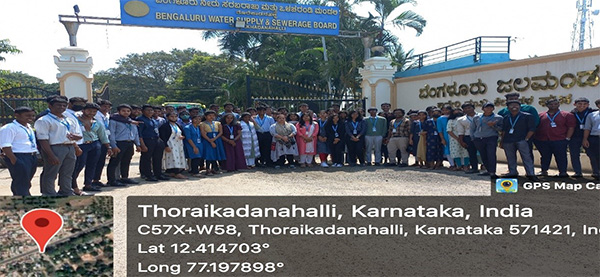
Industrial Visit for III BCOM F to T K Halli Water Treatment Plant
Date: 05 November 2022
Department of Commerce (UG), Kristu Jayanti College (Autonomous), Bengaluru, arranged an Industrial Visit for 78 students of III BCOM F to T K Halli Water Treatment Plant, Thoraikadanahalli on 5th November 2022. Industrial visit provides opportunity for students to have experiences on workflows, working methods and employment practices in the T K Halli Water Treatment Plant. Students were given clear introduction about the company and were shown the treatment and purification procedures in the water treatment plant. The engineers explained employee precautions and safety rules to the students. The industrial visit was a fruitful experiential learning for the students.
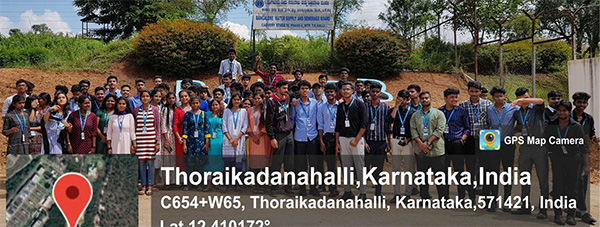
Industrial Visit to T K Halli Water Treatment Plant, Thoraikadanahalli (III BCOM C)
Date: 04 November 2022
Department of Commerce (UG), Kristu Jayanti College (Autonomous) arranged an Industrial Visit for 70 students of III BCOM C to T K Halli Water Treatment Plant, Thoraikadanahalli on 4th November 2022. Industrial visits provide students with an opportunity to learn practically through interaction, working methods and employment practices. It gives the students exposure to current work practices as opposed to theoretical knowledge being taught in their classrooms. Students were given a brief introduction about the company and they were taken to the water plant to familiarize with the Water Purification process: to the effort that goes into making sure water is purified, back to put into use. This is a complex process which is made easy with simple industrial solutions. The precautions the engineers take to work with chemicals like chlorine, shows how meticulous safety is followed for such a huge plant. Further, students learnt how any industrial process can always be further improved, the importance of safety and the efficient way to make any industrial process happen. The experience of the industrial visit to Bengaluru Water supply and Sewage board on 4th Nov was an eye opener to the students. This Industrial Visit helped them to learn process costing and can be used in double accounting system usually followed by the service industry. The journey from our college to the water treatment plant in the college bus was fun-filled and joyous. The route there was very scenic and showed nature as well as agricultural farmlands which was a sight to enjoy. The bus journey showed how the urban limits end and the village setting starts. We were served a variety of delicious food which was unlimited at a roadside hotel in Mysore Road and snacks to munch on while returning back to the campus. The overall experience of the industrial visit was fruitful and very experiential.
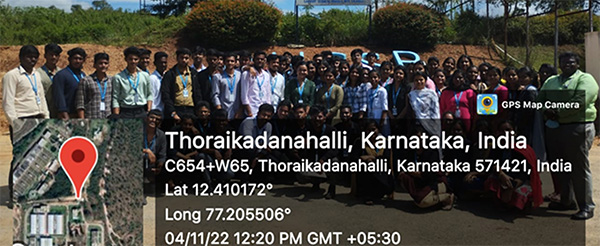
Industrial Visit to T K Halli Water Treatment Plant, Thoraikadanahalli (III BCOM B)
Date: 03 November 2022
On November 3, 2022, the Department of Commerce (UG), Kristu Jayanti College (Autonomous), Bengaluru, organized an industrial visit for 75 III BCOM B students to the T K Halli Water Treatment Plant. Students have the chance to explore workflows, working techniques, and employment procedures at the T K Halli Water Treatment Plant thanks to the industrial tour. Students received a thorough introduction to the business and were shown the water treatment plant's treatment and purification processes. The engineers instructed the students on employee safety guidelines and safeguards. The students learned via experience as a result of the productive industrial tour.

Industrial Visit to T K Halli Water Treatment Plant, Thoraikadanahalli (III BCOM A)
Date: 02 November 2022
Department of Commerce (UG), Kristu Jayanti College (Autonomous) arranged an Industrial Visit for 70 students of III BCOM A to T K Halli Water Treatment Plant, Thoraikadanahalli on 2nd November 2022. Industrial visits provide students with an opportunity to learn practically through interaction, working methods and employment practices. It gives the students exposure to current work practices as opposed to theoretical knowledge being taught in their classrooms. Students were given a brief introduction about the company and they were taken to the water plant to familiarize with the Water Purification process: to the effort that goes into making sure water is purified, back to put into use. This is a complex process which is made easy with simple industrial solutions. The precautions the engineers take to work with chemicals like chlorine, shows how meticulous safety is followed for such a huge plant. Further, students learnt how any industrial process can always be further improved, the importance of safety and the efficient way to make any industrial process happen. The experience of the industrial visit to Bengaluru Water supply and Sewage board on 2nd Nov was an eye opener to the students. This Industrial Visit helped them to learn process costing and can be used in double accounting system usually followed by the service industry. The journey from our college to the water treatment plant in the college bus was fun-filled and joyous. The route there was very scenic and showed nature as well as agricultural farmlands which was a sight to enjoy. The bus journey showed how the urban limits end and the village setting starts. We were served a variety of delicious food which was unlimited at a roadside hotel in Mysore Road and snacks to munch on while returning back to the campus. The overall experience of the industrial visit was fruitful and very experiential.
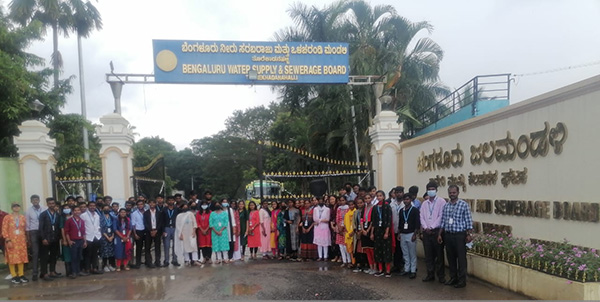
Industry Visit for 3rd year B.Com B section
On 9th of September 2022 an industrial visit was conducted for the students of 3rd year B.Com B section to MANMUL – Nandhini in Gejjala Gere, Mandaya district. 77 students along with faculty in charge Mr. Shashi kumar M from department of commerce which was Organised by Department of Commerce(UG) Students have got the opportunity to visit various processing units of the milk and milk products. As per the process milk is been collected from the village and then it is divided as per its quality is been pasteurized and used then for the further conversation stage of butter, ghee, sweets etc. The Mandya Milk union produces an average of 9.72 lakh kg per day of milk , with an average of 3.07 lakh liters of milk and 0.62 lakh kg of Curds and also products such as paneer, peda, butter, ghee, skim milk powder (SMP). The next spot of industrial visit was Janapada lokha were students witnessed different kinds of art forms, culture and heritage which was been preserved in the museum left behind by our ancestors
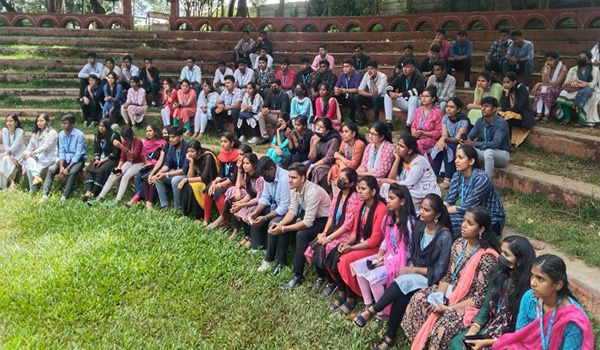
Industry Visit for V BCOM Section D
Date: 07-09-2022
Industrial visits provide the students with an opportunity to learn practically through interaction, working methods and employment practices. It gives the students exposure to current work practices as opposed to theoretical knowledge being taught in their college classrooms. The students of B.COM D visited Chamundeshwari Sugar Factory. They have seen the whole process from sugarcane to sugar. They have witnessed the unloading of sugarcane to the processing and packing of sugar. The students were then taken to see Janapadha Loka, where the famous Karnataka culture is displayed. All the students actively participated in their Industrial Visit and experienced classroom learning to the practical knowledge through this Industrial Visit.
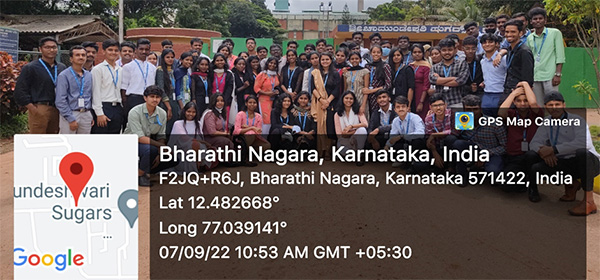
Industry Visit for V BCOM “E”
Date: 02-09-2022
Sugar plays a vital role in our day to day life. We have visited to Chamundeshwari Sugar Factory. We have seen whole process from sugarcane to Sugar. We have seen unloading to till packing of sugar. Then we have visited to toy factory. There we have experienced how the toys and wooden toys. Also we came to know that fixing of price, fit the product into the market. Finally, we have visited to Janapadha Loka, the famous Karnataka culture displayed. All the students were actively participated in their Industrial visit and experienced class room teaching to the practical knowledge through this Industrial Visit. They able to connect this industrial visit with their subject.
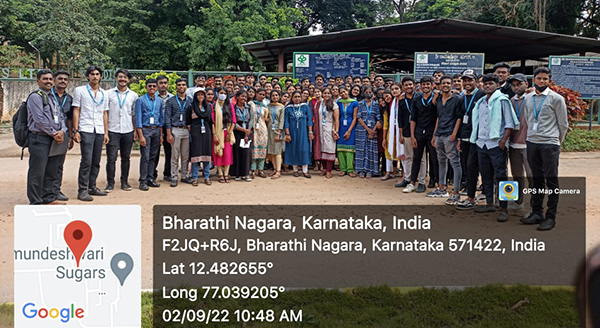
Industry Visit
Silk is the most elegant textile in the world with unparalleled grandeur, natural sheen, and inherent affinity for dyes, high absorbance, light weight, soft touch and high durability and known as the “Queen of Textiles” the world over. We visited to silk worm Industry we saw entire process of cocoon and extraction process of silk out of cocoon. Later we visited to toy factory so there we experienced how the toys and other wooden toys were made and how the cost of the toys was fixed and making the product fit into the market. And then we visited to Janapadha loka, the famous Karnataka culture displayed. All the students were actively participated in their Industrial visit and experienced class room teaching to the practical knowledge through this Industrial Visit.
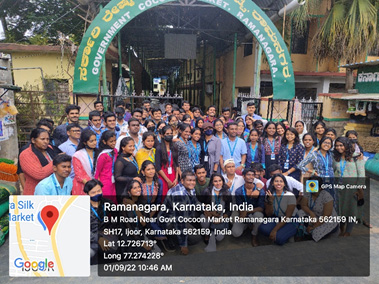
Date: 26/02/2020
Class & No. of students: II B.Com ACCA - 71 Students
Objective of the Visit: This activity was carried out in order to provide an opportunity to the students to give a practical understanding about the operation of a factory including the process and packaging.
We reached the factory around 10 a.m. and a Supervisor took the students around the plant and briefed them about the operations of the factory and the process involved and details of packaging of milk. He explained the detailed process of milk storing, processing and packaging. The supervisor further explained and demonstrated the different stages of milk production to its storage and different ways of packaging required for its preservation. The students also visited the different sections where a variety of milk products like Cheese, Curds, Ghee and Sweets were produced. The Supervisor attended and answered the queries of the students with patience.
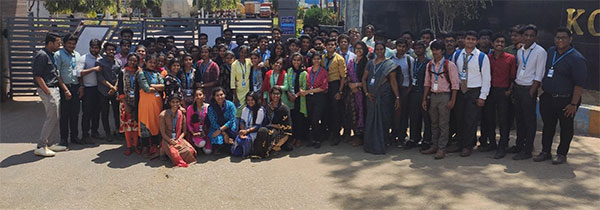
Date: 20/02/2020
Class & No. of students: VI B. Com Professional and IV B. Com G (121 students)
Objective of the visit: This activity was carried out in order to provide the students an understanding about working of the factory, the processing and packaging involved together with the realization of concepts of Methods and Techniques of Cost Accounting.
It took nearly 2 hours to reach Kolar from Kristu Jayanti College. We could smell the aroma of milk as soon as we entered the gates of KOMUL. Students were quite excited and were keen to learn and observe. We were greeted by the staff who were going to show us around the factory. Information about every step and process were very well explained by the staff and they also quite patiently answered all the students’ queries.
It was very informative and to have observed it with our own eyes the dedication and the hard work of all the employees at KOMUL just to provide the city with good and hygienic milk added a different perspective.
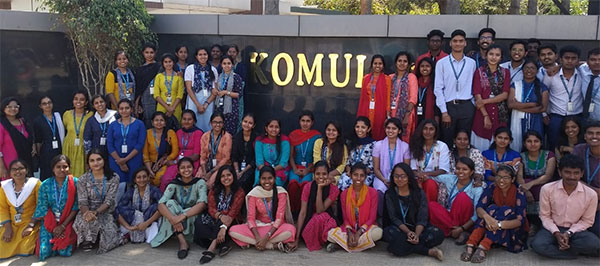
Date: 20/02/2020
Class & No. of students: VI B. Com Professional and IV B. Com G (121 students)
Name of the company visited: Kolar-Chikkaballapura District Co-operative Milk Producers Union Ltd., (KOMUL)
Name and details of the company: Kolar-Chikkaballapura District Co-operative Milk Producers Union Ltd., (KOMUL) is Karnataka’s second highest Milk Producing District organization, first being Bangalore Milk Union Ltd. (BOMUL). It is a District level apex body of milk cooperatives in Karnataka, which aims to provide remunerative returns to the farmers by eliminating the middlemen and also to serve the interest of consumers by providing quality Milk & milk products, which are good value for money. The area of operation is restricted to Kolar and Chikkaballapura Districts having 2919 villages of 11 revenue Taluks. Dairy along with 3 Chilling Centers has obtained certification for ISO-22000.
Objective of the visit: This activity was carried out in order to provide the students an understanding about working of the factory, the processing and packaging involved.
It took nearly 2 hours to reach Kolar from Kristu Jayanti college. We could smell the aroma of milk as soon as we entered the gates of KOMUL. Students were quiet excited and were keen to learn and observe. We were greeted by the staff who were going to show us around the factory. Information about every step and process were very well explained by the staff and they also quiet patiently answered to all students’ queries and curiosity.
It was very informative and to have observed it with our own eyes the dedication and the hard work of all the employees at KOMUL just to provide the city with good and hygienic milk added a different perspective.
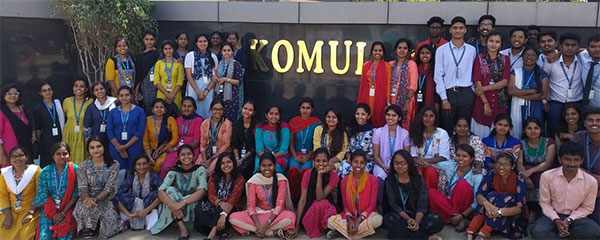
Date: 19/02/2020
Class & No. of students: IV B.Com P1 - 62 Students
The students were briefed on the various units in the factory. The supervisor guided the students through various processes in the factory. The first unit visited was the milk packaging unit where automated machines were used to pack milk. They also showed students the manufacturing of various products which are produced with milk like ghee etc. The second part of the visit was the storage and packing of “Goodlife” milk. The students gained knowledge and had a wonderful experience in KOMUL.
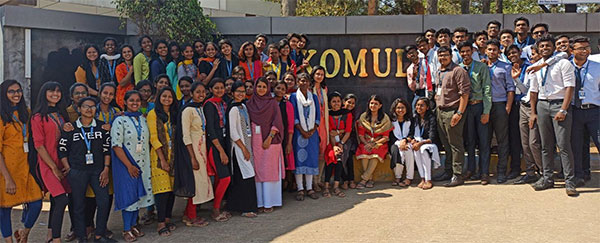
Date: 19-Feb-2020
Class & No. of students: IV B. Com ‘D’ - 67 STUDENTS
Name of the company visited: KOMUL, Kolar Dairy Premises, Huthur Post, Kolar.
Name and details of the company: Kolar-Chikkaballapura District Co-operative Milk Producers Union Ltd., (KOMUL) is Karnataka’s second highest Milk Producing District organization. It is a District level apex body of milk cooperatives in Karnataka, which aims to provide remunerative returns to the farmers by eliminating the middlemen and also serves the interests of consumers by providing quality milk & milk products, which are good value for money. It has obtained certification for ISO-22000.
Objective of the visit: Industrial visit was conducted to provide an insight to the concepts of cost accounting by observing the internal working of a milk producing organization.
Kolar-Chikkaballapura District Co-operative Milk Producers Union Ltd. is a District level apex body of milk cooperatives in Karnataka. The production and packing process was demonstrated to the students by the members of the unit in detail. Students were taken into various production units like milk, curd products, milk sweets etc. Kolar Chikkaballapura Co-Operative Milk Union procures 10.7 lakh litres of milk per day. The quality analysis of huge quantities of milk is done at different levels like at MPCS, BMC, CC, and at DAIRY level before it is taken for processing. Considering the health of the consumers and as per FSSAI rules the Union is striving in providing quality MILK and Milk Products to consumers. The Quality of milk is being maintained by using state of the art Technology and testing Mechanisms. The Union has a Laboratory with required facilities for the analysis of milk and its products. Commercial value of milk is largely based on its fat content. Therefore, determination of the fat content of the milk has special significance in the evaluation of quality of milk. Butyrometric methods are employed for the rapid and routine determination of fat in milk.

Date: 18/02/2020
Class & No. of students: IV B. Com P2 Section & 67 Students
Name of the company visited: KOMUL, Kolar Dairy Premises, Huthur Post, Kolar.
Name and details of the company: Kolar-Chikkaballapura District Co-operative Milk Producers Union Ltd., (KOMUL) is Karnataka’s second highest Milk Producing District organization. It is a District level apex body of milk cooperatives in Karnataka, which aims to provide remunerative returns to the farmers by eliminating the middlemen and also serve the interest of consumers by providing quality Milk & milk products, which are good value for money. The area of operation is restricted to Kolar and Chikkaballapura Districts having 2919 villages of 11 revenue Taluks. Dairy along with 3 Chilling Centers has obtained certification for ISO-22000.
Objective of the visit: This activity was carried out in order to provide the students a better understanding of cost accounting concepts, observing on to how a factory works and how processing and packaging take place.
Once we reached the factory, the students were briefed about the factory workings and the processing and packaging process of milk by the Supervisor.. He explained the detailed process of milk storing, processing and packaging. The supervisor explained and demonstrated the different stages of milk production to its storage and different ways of packaging that is required for its preservation. The students also visited the different sections where a variety of milk products were produced. The supervisor answered the queries of the students with patience.
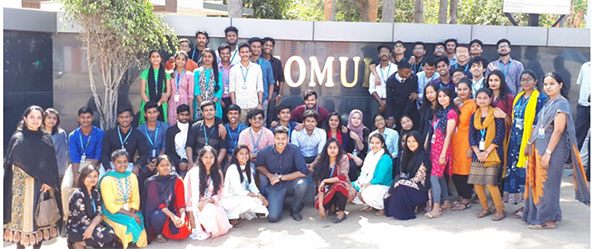
Date: 18/02/2020
Class: IV B. Com ‘B’ Section – 65 Students
Presently the Union has full-fledged dairy at Kolar with an installed capacity of 2.0 LLPD, and three chilling centres at Chintamani, Sadli, & Gowribidnur with 1.0 LLPD capacity each respectively. KOMUL started marketing liquid milk in polythene sachets in the entire Kolar District and parts of Bangalore City from 1994. The Mnemonic Symbol of NDDB was adopted by the Union from April’ 2002 to market the liquid milk. The custom packing of Set Curds production was undertaken for GCMMF under the brand name of Amul Masti-Dahi during Aug’2001.
Objective of the visit: To enable the students to observe and get an insight into the manufacturing process of milk and its various products and have an in-depth understanding of cost accounting.
On 18th of February 65 students and 2 faculty members visited Komul. We left the campus at 8.45 a.m. and reached the industry by around 11 o’clock. After getting permission from the authority, we entered the plant. One of the staff members from the industry was assigned as the guide for us.
The unit processes 11 lakh litres of milk per day. In the initial stage milk is collected from various households in huge containers, and then the workers take the samples from the container and send it to the lab after that the production department processes the milk. The processed milk is divided into various types based on its fat content. Later the students were taken to curd, cheese butter and sweet department. In the sweet department Mysore Pak was being prepared. Few students got a chance to taste it. Later we visited the distribution room and small packets of Good Life Milk were given to students for tasting. There were many other products being produced in the industry like ice cream, Paneer etc. At the end they provided buttermilk as refreshment to students and teachers.
The industrial visit was very informative to students. Through this visit they were able to understand the stages involved in the process of milk production.
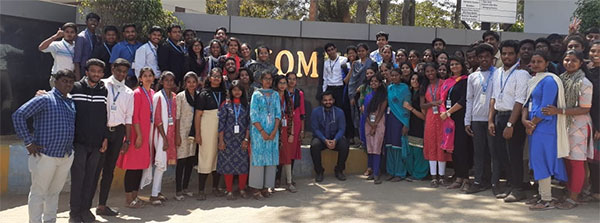
Date: 18/02/2020
Class & No. of students: IV BCOM P3 & 50 Students
Objective of the visit:This activity was carried out in order to provide the students an understanding of the cost accounting concepts by observing the working of the factory, the processing and packaging involved.
Once we reached the factory, the students were briefed about the factory workings, the processing and packaging process of milk by the Supervisor. He explained in detail the process of milk storing, processing and packaging. The supervisor explained and demonstrated the different stages of milk production, its storage and different ways of packaging required for its preservation. The students also visited the different sections where a variety of milk products were produced. The supervisor answered the queries of the students with patience.
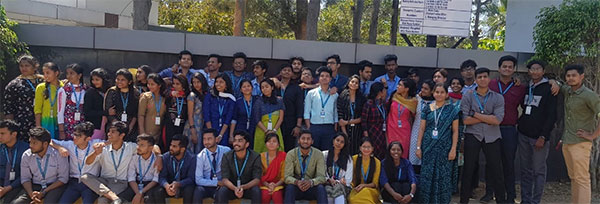
Date: 05.02.2020
Place Visited: KOMUL, Kolar, Bangalore
Class and No. of students: IV B. Com ‘A’ Section - 68 Students
About the company: Kolar Chikkaballapura District Cooperative Milk producers Union Ltd is the second highest milk producing unit established in 1926. It is a district level apex body of milk cooperatives in Karnataka aiming to serve the interests of customers and provide good returns to the farmers.
Objective: The purpose of taking students for industrial visit was to keep them abreast with the practical side of their coursework and to provide an exposure to students regarding practical working environment.
On 05.02.2020 68 students of IV B.Com A visited the KOMUL factory at Kolar with Dr. Reenu Mohan and Dr. Rajakamal. Presently KOMUL has full-fledged dairy at Kolar and three chilling centers at Chinthamani, Sadli, & Gowribidnur. KOMUL started marketing of liquid milk in polythene sachets in the entire Kolar District and parts of Bangalore City in 1994.The factory produces milk, milk powder, ghee, butter, curd, milkshakes, sweets and frozen desserts. KOMUL collects 20 Lakh litres of milk everyday through Bulk Milk Coolers and Computerized systems at villages. It complies with statutory and regulatory requirements for procurement, processing, manufacturing, packing and prompt delivery of products.
The students were shown the purification process, coding of the packets, storage units for distribution of the milk. The milk collected has to undergo a quality check before being processed. Then it gets pasteurized and packed. Then the students were taken through the production area of ghee, butter and sweets. At the end the students relished the buttermilk of KOMUL. The students had their lunch on the way back to college.
The students were happy and satisfied on getting the opportunity to see the working procedures and process of milk production in the factory. They understood the quality issues and methods undertaken before the final product reaches the consumers. They were able to understand the intricacies involved while applying the theoretical concepts learned in Cost Accounting. This visit provided students a good opportunity to gain awareness about industrial practices and new technologies. It provided them with the practical knowledge of running a factory and issues concerned with the production process.
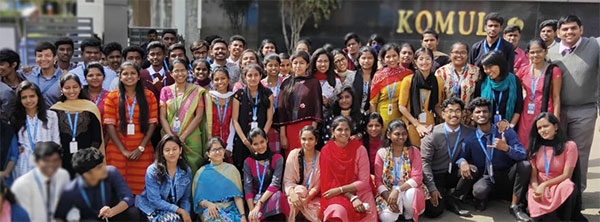
Date: 06- 02-2020
Class & No. of students: IV B. Com C Section - 70 Students
Name of the company visited: KOMUL, Kolar Dairy Premises, Huthur Post, Kolar.
Name and details of the company: Kolar-Chikkaballapura District Co-operative Milk Producers Union Ltd., (KOMUL) is Karnataka’s second highest Milk Producing District organization. It is a District level apex body of milk cooperatives in Karnataka, which aims to provide remunerative returns to the farmers by eliminating the middlemen and also serve the interest of consumers by providing quality Milk & milk products, which are good value for money. It has obtained certification for ISO-22000.
Objective of the visit: Industrial visit was conducted to provide an insight to the students regarding the internal working of milk producing organization and gain knowledge of cost accounting practices.
The production and packing process were explained to the students by Mr. Ramappa in detail. Students were taken into various production units like milk, curd products, milk sweets etc. Kolar Chikkaballapura Co-Operative Milk Union procures 10.7 lakh kgs of milk per day. The quality analysis of huge quantities of milk is done at different levels like at MPCS, BMC, CC, and at DAIRY level before it is taken for processing. Considering the health of consumers and as per FSSAI rules, the Union strives to provide quality MILK and Milk Products to consumers. The Quality of milk is maintained by using state of the Art Technology and testing Mechanisms. The Union has a Laboratory with required facilities for the analysis of milk and products, ingredients as per the procedure. Commercial value of milk is largely based on its fat content. Therefore, determination of the fat content of the milk has special significance in the evaluation of quality of milk. Butyrometric methods are employed for the rapid and routine determination of fat in milk.
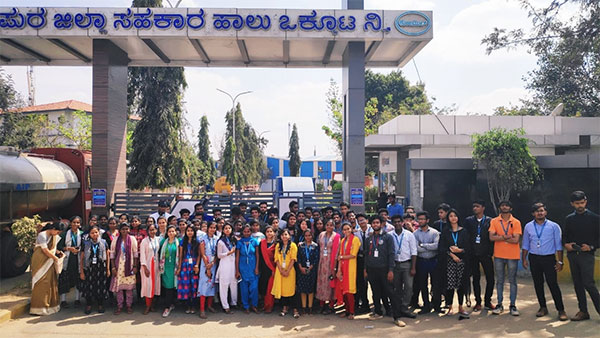
Date: 06- 02-2020
Class & No. of students: II B. Com P3 Section & 57 Students.
Name of the company visited: Kolar-Chikkaballapura District Co-operative Milk Producers Union Ltd., (KOMUL) , Huthur Post, Kolar.
Name and details of the company:Kolar-Chikkaballapura District Co-operative Milk Producers Union Ltd., (KOMUL) is Karnataka’s second highest Milk Producing District organization. It is a District level apex body of milk cooperatives in Karnataka, which aims to provide remunerative returns to the farmers by eliminating the middlemen and also serves the interests of consumers by providing quality Milk & milk products, which are good value for money. It has obtained certification for ISO-22000.
Objective of the visit: Industrial visit was conducted to provide an insight to the students regarding the internal working of a milk producing organization.
The production and packing process were explained to the students by Mr. Ramappa in detail. Students were taken into various production units like milk, curd products, milk sweets etc. Kolar Chikkaballapura Co-Operative Milk Union procures 10.7 lakh kgs of milk per day. The quality analysis of huge quantities of milk is done at different levels like at MPCS, BMC, CC, and at DAIRY level before it is taken for processing. Considering the health of consumers and as per FSSAI rules, the Union strives to provide quality MILK and Milk Products to consumers. The Quality of milk is maintained by using state of the Art Technology and testing Mechanisms. The Union has a Laboratory with required facilities for the analysis of milk and products, ingredients as per the procedure. Commercial value of milk is largely based on its fat content. Therefore, determination of the fat content of the milk has special significance in the evaluation of quality of milk. Butyrometric methods are employed for the rapid and routine determination of fat in milk.

Date: 04/02/2020
Class & No. of students: IV B. Com P4 - 27 Students
Name of the company visited: Kolar-Chikkaballapura District Co-operative Milk Producers Union Ltd., (KOMUL)
Name and details of the company: Kolar-Chikkaballapura District Co-operative Milk Producers Union Ltd., (KOMUL) is Karnataka’s second highest Milk Producing District organization. It is a District level apex body of milk cooperatives in Karnataka, which aims to provide remunerative returns to the farmers by eliminating the middlemen and also serve the interest of consumers by providing quality Milk & milk products, which are good value for money. The area of operation is restricted to Kolar and Chikkaballapura Districts having 2919 villages of 11 revenue Taluks. Dairy along with 3 Chilling Centers has obtained certification for ISO-22000.
Objective of the visit: This activity was carried out in order to provide the students an understanding of the cost accounting concepts by observing the working of the factory, the processing and packaging involved.
Once we reached the factory, the students were briefed about the factory workings, the processing and packaging process of milk by the Supervisor. He explained in detail the process of milk storing, processing and packaging. The supervisor explained and demonstrated the different stages of milk production, its storage and different ways of packaging required for its preservation. The students also visited the different sections where a variety of milk products were produced. The supervisor answered the queries of the students with patience.
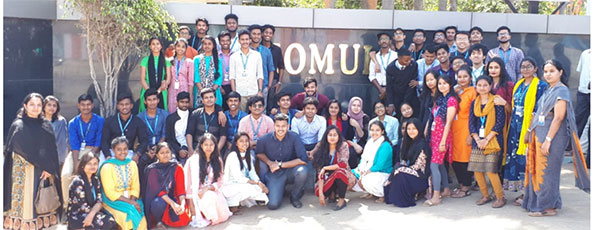
Date: 31/01/2020
Class & No. of students: IV B.COM E Section
Name of the Place Visited: Kolar-Chikkaballapura District Co-operative Milk Producers Union Ltd” (KOMUL).
Name and details of the company: Kolar - Chikkaballapura District Co-operative Milk Producers Union Ltd” (KOMUL) is Karnataka’s 2nd highest Milk Producing District organisation. It is a District level apex body of milk cooperatives in Karnataka, which aims to provide remunerative returns to the farmers by eliminating the middlemen and also serve the interest of consumers by providing quality Milk & milk products, which are good value for money.
Once the Dist. was named as Land of Gold & Silk, is making inroads in Quality Milk Production. KOMUL first installed “Bulk Milk Coolers & Community Milking Machines” at Society level in the state of Karnataka to get the quality milk required for UHT milk packed at Kolar Dairy under the brand name of Nandini ‘Good-Life’.
Presently the Union has a full pledged dairy at Kolar' with an installed capacity of 2.0 LLPD and three chilling centres at Chintamani, Sadli, & Gowribidnur with 1.0 LLPD capacity at each place respectively. KOMUL started marketing liquid milk in polythene sachets in the entire Kolar District and parts of Bangalore City in 1994. The Mnemonic Symbol of NDDB was adopted by the Union in April 2002 to market the liquid milk. The custom packing of Set Curds production was undertaken for GCMMF under the brand name of Amul Masti-Dahi on Aug 5, 2001.
Objective of the visit: To enable the students to observe and know the manufacturing and the packing process of milk and its various products in a factory in a systematic manner and to make the student to understand the prospective area of work like marketing, finance, logistics, etc. and also to provide an opportunity for students to ask questions related to their area of interest and get clarity on real time work experience which would enhance their interpersonal skills and knowledge.
On 20th of February 64 students and 2 faculty members visited Komul. For the transportation we had one private bus and one TT. We started from the campus at 8.35 a.m. and reached the industry around 10:45 a.m. After getting the permission from the authority, we entered the plant and one of the staff members (Mr. Ramamurthy) arranged a person from the industry to guide us throughout the day.
The unit processes 11 lakh liters of milk per day. In the initial stage milk is collected from various households in huge containers, and then the workers take the samples from the container and send it to the lab. After this stage the production department processes the milk. The processed milk is divided into various types based on its fat content. Then students were taken to curd, cheese butter and sweet unit. In the sweet unit Mysore Pak was being prepared. Few students got a chance to taste it. Later, we visited the distribution room and small packets of Good Life Milk were given to students for tasting. There are many other products produced in the industry like ice cream, Paneer etc. At the end they provided us with buttermilk as a refreshment drink. The industrial visit was very informative to students. Through this visit they were able to understand the stages of the process of milk production.
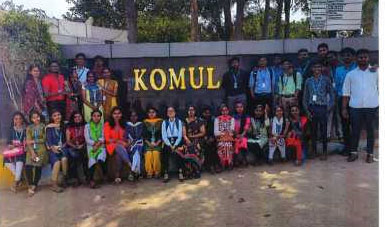
Date: 29/01/2020
Class & No. of students: II BCom P1 Section- 66 Students
Name of the company visited: NSL Sugars Limited
Name and details of the company: NSL Sugars limited is located in the Industrial section of KOPPA 122 kms from Bengaluru. NSL Sugars Limited (NSL) is one of the most efficient sugar companies in south India and a sugar arm of ‘NSL’ group. NSL Group entered the ‘sugar’ industry as part of their diversified interests in agro- commercial crop business.
Objective of the visit: The trip was conducted in order to get an understanding about how a sugar factory works and what are the different stages of management and production processes in the sugar industry.
We reached the factory at 11.a.m as soon as we reached Mr.Mahesh, the Supervisor oriented the students about the factory workings and the production process of sugar. He explained the entire process of sugar production. We came to know that NSL Sugars Ltd. provides livelihood to around thousands of families of sugarcane growers and livelihood to about 3000 families by directly involving in plant operations and indirectly 5000 families by involving them in harvesting and transportation of sugarcane. Procurement of sugarcane is the first step in the process and then levelling of sugarcane is done using preparatory devices. In these devices, the sugarcane is crushed. Then the crushed sugarcane moves to the mill where salvarizers, shredder, fibrizer are present where the sugarcanes are chopped into small pieces, crushed and the juice is extracted. The dry waste obtained from this process is used for power production, thereby reducing wastage in the process. The sugarcane juice extracted is then processed using a clarifier in a boiling operation at 80oC -100oC. Then the output in the form of plasma is boiled and heated under vacuum at 100 degree Celsius in order to absorb all moisture content in it and finally sugar crystals are produced. This crystal is again heated at 120 degree Celsius and milk of lime and sulphur dioxide is added simultaneously in order to get clean white sugar. The by-product molasses are taken to the distillery unit for producing spirit. The final white crystals are packed in a bag of 25kgs and sent to the warehouse. It takes approximately 2 days to get white crystal sugar.
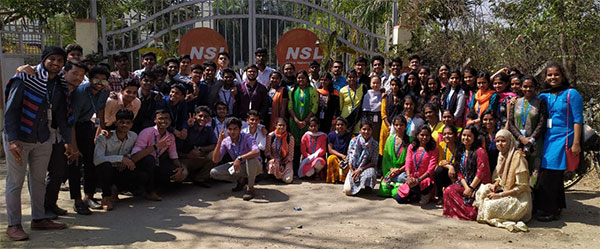
Date: 27/01/2020
Class & No. of students: II B. Com P4 Section & 76 Students.
Name of the company visited: NSL Sugars Limited.
Name and details of the company: NSL Sugars limited, situated in Industrial section of KOPPA 122 kms from Bengaluru. NSL Sugars Limited (NSL) is one of the major companies in south India and a sugar arm of ‘NSL’ group. NSL Group entered the ‘sugar’ industry as part of their diversified interests in agro- commercial crop business.
Objective of the visit: The trip was conducted in order to get an understanding about how a sugar factory works and what are the different stages of management and production processes in the sugar industry.
We reached the factory at 11.a.m as soon as we reached Mr.Mahesh, the Supervisor oriented the students about the factory workings and the production process of sugar. He explained the entire process of sugar production. We came to know that NSL Sugars Ltd. provides livelihood to around thousands of families of sugarcane growers and livelihood to about 3000 families by directly involving in plant operations and indirectly 5000 families by involving them in harvesting and transportation of sugarcane. Procurement of sugarcane is the first step in the process and then levelling of sugarcane is done using preparatory devices. In these devices, the sugarcane is crushed. Then the crushed sugarcane moves to the mill where salvarizers, shredder, fibrizer are present where the sugarcanes are chopped into small pieces, crushed and the juice is extracted. The dry waste obtained from this process is used for power production, thereby reducing wastage in the process. The sugarcane juice extracted is then processed using a clarifier in a boiling operation at 80oC -100oC. Then the output in the form of plasma is boiled and heated under vacuum at 100 degree Celsius in order to absorb all moisture content in it and finally sugar crystals are produced. This crystal is again heated at 120 degree Celsius and milk of lime and sulphur dioxide is added simultaneously in order to get clean white sugar. The by-product molasses are taken to the distillery unit for producing spirit. The final white crystals are packed in a bag of 25kgs and sent to the warehouse. It takes approximately 2 days to get white crystal sugar.
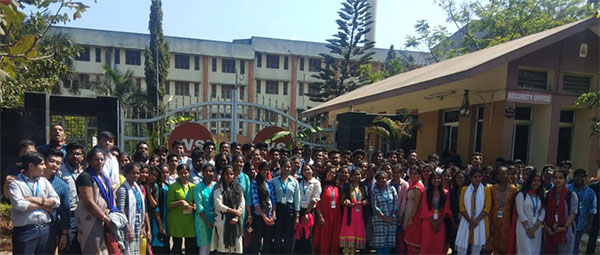
Date: 25/01/ 2020
Number of beneficiaries: VI Semester B. Com ‘E’ Section - 44 Students
Objective: To get exposure about the complete process of coffee Curing & manufacturing.
Places/Industry Visited: Visit to Sri Uma Coffee Curing Works Private limited plot no.8, KIADB industrial area, kudlur Kushalnagar, Karnataka 571234
Uma coffee works was established in 1994. Mr. Sreedhar.A was the founder of Uma coffee trading. In 2006 a coffee processing unit started and then it was renamed as Uma coffee works. In 2019 a new division of roast and ground coffee was started and currently Uma air roasted coffee work is the one of the most successful coffee works in Karnataka
Total 46 Students were taken to the unit to understand the manufacturing process. First, the coffee seeds are peeled and the inner part of coffee seeds are taken out and separated into two different processes.
The beans are then dried by the sun or a machine to be put into a huller which removes the remaining covering. The polished beans (called green coffee) are then ready to be sorted by hand or machine to remove defective beans and extraneous material, and finally to be graded by size. The drying operation is the most important stage of the process, since it affects the final quality of the green coffee. A coffee that has been over dried will become brittle and produce too many broken beans during hulling (broken beans are considered defective beans).
In the next process the coffee seeds are taken to a roasting process where the seeds will be roasted into brownish color. And in the final process, the roasted coffee seeds are ground into powder and left for cooling for some time. Later the coffee powder is packed. The coffee machine runs 24hours a day and it functions every day.
The visit was aimed to connect the concepts of Methods and Techniques of Cost Accounting taught in the classroom.
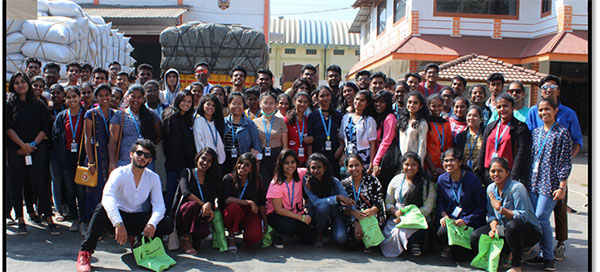
Date: 24th January 2020
Number of beneficiaries: 91 students of VI Semester B. Com ‘E’ and ‘T’ Section
Objective: To get exposure about working of sugar industry.
Places/Industry Visited: Visit to National Sugar Industries Limited Madhur, Mysore Road Bangalore.
NSL Sugars Limited (NSL) is one of the most efficient integrated sugar companies in south India and a sugar arm of ‘NSL’ group. It was established as an associate company of NSL group in the year of 2003-04 with the vision that the real scope for economic activity lies in agro-based Industry in rural India. Today, NSL Sugars is amongst the top ten sugar companies in India.
Students were given a brief introduction about the company and they were taken to the factory to familiarize with the sugar manufacturing process. Firstly, they took the students to the blend station where tons of sugarcane was dumped into the transferring station, which was then transferred to the chopping station. Once the sugarcane was chopped, they were taken to the next process where the chopped sugarcane is crushed to extract juice. The extracted juice is then heated and melted to the stage of brown sugar. The brown sugar is again boiled to a point where it turns black in colour. Then, it is transferred into a rotating container, till the color changes to white due to vaporization of the liquid state, where the white sugar is generated. White sugar was shifted to packaging unit, weighing 50 kilos per bag. The entire process would take 12 hours to complete a process and the machines run 24 hours a day. The visit aimed to give a practical exposure on the Methods and Techniques of Cost Accounting.
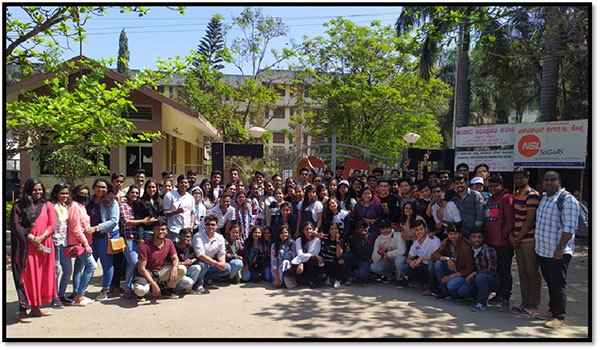
Date: 24th January 2020
Number of beneficiaries: VI Semester B. Com Tourism - 91 students
Objective: To get exposure about working of sugar industry.
Places/Industry Visited: Visit to National Sugar Industries Limited Madhur, Mysore Road Bangalore.
NSL Sugars Limited (NSL) is one of the most efficient integrated sugar companies in south India and a sugar arm of ‘NSL’ group. It was established as an associate company of NSL group in the year of 2003-04 with the vision that the real scope for economic activity lies in agro-based Industry in rural India. Today, NSL Sugars is amongst the top ten sugar companies in India.
Students were given a brief introduction about the company and they were taken to the factory to familiarize with the sugar manufacturing process. First, they took the students to the blend station where tons of sugarcane was dumped into the transferring station, which was then transferred to the chopping station. Once the sugarcane was chopped, it was taken to the next process where the chopped sugarcane is crushed to extract juice. The extracted juice is then heated and melted to the stage of brown sugar. The brown sugar is again boiled to a point where it turns black in colour. Then, it is transferred into a rotating container, till the color changes to white due to vaporization of the liquid state, where the white sugar is generated. White sugar was shifted to packaging unit, weighing 50 kilos per bag. The entire process would take 12 hours to complete a process and the machines run 24 hours a day. The visit aimed to give a practical exposure on the Methods and Techniques of Cost Accounting.
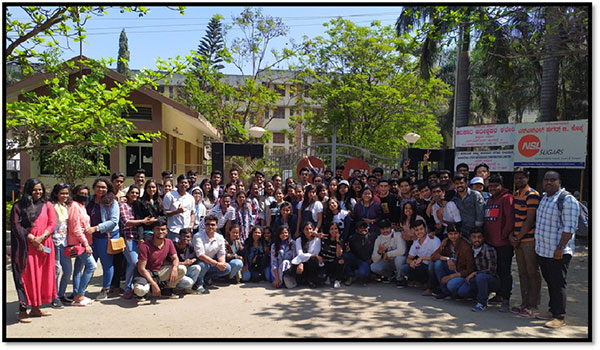
Date: 24/01/2020 to 27/01/2020.
Number of beneficiaries: IV Semester B. Com Tourism - 47 students
Objective: To help the students to know more about the world heritage sites, historical monuments of Karnataka and an understanding of tourism marketing concepts and to have a better understanding about the contribution of South Indian temple architecture.
Places visited: Hampi, Pattadakal, Aihole, Badami.
The journey started from Bangalore at 9 p.m. on 24th Jan 2019 and reached Hampi on 25th Jan at 4.30 a.m and the students then checked into hotel Malligi.
By 8.30 a.m after breakfast, the students went sight-seeing in Hampi. First, they visited the Masterpiece of Hampi (i.e) the Vittala temple in which the Stone chariot is placed. The tourist guide explained all the historical background and the importance of the temple and its architectural design,he also gave a brief description about the historical importance of Hampi. And later the students covered tourist attractions like Queen's bath, Elephant stable, Veera Narashimha and Badavi linga temple. The students visited the Hampi bazaar and at the end of the day visited the Tungabhadra dam site.
Second day, they covered three places - Aihole, Pattadakal and Badami. In Aihole they visited Durga temple and other important temples like Lad Khan temple and other places. The guide explained in detail how the temples were built and for what reasons they were used and later what happened to those temples. The museum in Aihole is a storehouse of exhibits that tell you more about the temples and architecture of the area. In Pattadakal a brief description about the architecture and the reason for being one among the world heritage sites was given. All the ten temples have their own style of architecture. The friezes in the temples display various Vedic and Puranic concepts, depicting stories from the Ramayana, the Mahabharata, the Bhagavata Purana, explaining the mythological stories of Ramayana and Mahabharata. They also visited the functioning temple, the Virupaksha temple. The architecture involved both South Indian and North Indian style.
In Badami they visited the four caves in which the 1st cave was dedicated to Lord Shiva, 2nd and 3rd to Lord Vishnu and the 4th cave for Buddhism. The first cave comprises the Nataraja sculpture of Lord Shiva.
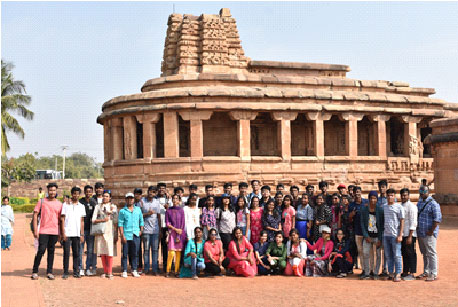
Date: 23rd January 2020
Place of Visit: Lepakshi, Anantapur District, Andhra Pradesh
Class & No. of Students - II BCOM Tourism - 56 Students.
Objective: The field was organized to provide an opportunity for students to experience and witness various tourism products of India and its effective usage.
A Tourism field visit to Lepakshi was organised on 23rd January 2020 by the Department of Tourism for the II Sem B.Com Tourism students. The team reached the destination at 9:30 a.m. after changing a bus at the Karnataka border. A seasoned and knowledgeable tourist guide Mr. Virupanna was arranged to provide in-depth information about Lepakshi. Lepakshi is a village in the Anantapur District of Andhra Pradesh, India. It is located 15 km (9.3 mi) east of Hindupur and approximately 120 km north of Bangalore. According to legend ’Le pakshi' is the place where Lord Rama found the bird Jatayu wounded after a futile battle against Ravana. Lord Rama said compassionately, “Le Pakshi '' which means ‘rise bird’ in Telugu..Lepakshi is culturally and archaeologically significant as it is the location of shrines dedicated to Shiva, Vishnu and Veerabhadra which were built during the Vijayanagara Kings' period (1336–1646). The temples are the location of mural paintings of the Vijayanagara kings and Telugu inscriptions. Near the temple complex is a large granite Nandi bull. There is also a three-headed bull with a single body carved on the pillar of the main entrance. On a hillock known as Kurma Saila, which means "tortoise shaped hill", are other temples dedicated to Papanatheswara, Raghunatha, Srirama, and Durga. Lepakshi is also famous for leather puppets and puppet shows. This field trip was really an opportunity for students to practically experience the theoretical knowledge gained from the classroom sessions on Tourism Products of India. Faculty coordinator Prof. Retheesh PT accompanied the students.
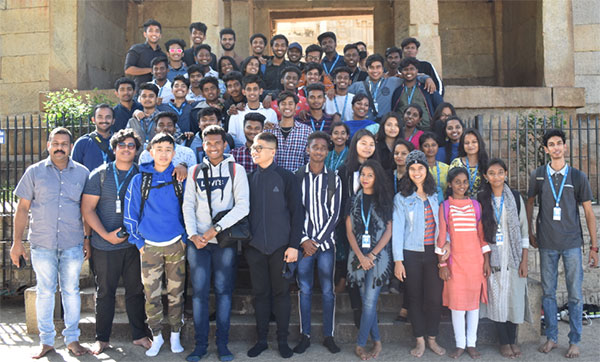
Date: 20th January 2020 and 28th January 2020
Number of beneficiaries: VI Semester B.Com A and C Section – 98 Students
Objective: Understand the practical functioning of a manufacturing industry.
Places/Industry Visited: Visit to National Sugar Industries Limited Koppa, Mandya District
NSL Sugars Limited (NSL) is one of the most efficient integrated sugar companies in south India and a sugar arm of ‘NSL’ group. It was established as an associate company of NSL group in the year of 2003-04 with the vision that the real scope for economic activity lies in agro-based Industry in rural India. Today, NSL Sugars is amongst the top ten sugar companies in India. The visit aimed to give a practical exposure on the Methods and Techniques of Cost Accounting.
Students were given a brief introduction about the company and they were taken to the factory to familiarize with the sugar manufacturing process. First, the students were taken to the section where tons of sugarcane was crushed to extract the juices, the juice is then heated to 70o C, the milk of lime and Sulphur dioxide is added simultaneously for clarification of juice. The clarified juice is filtered and evaporated and sugar is crystallized from it. The last process is where the end product is transferred into packets that accommodate 50 kilos per bag. The entire process usually takes 12 hours to complete a process and the machines run 24 hours a day.
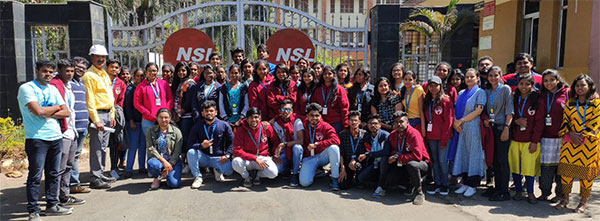
Date: 21/01/2020
Number of beneficiaries: VI Semester B. Com A Section -45 Students
Objective: Understand the practical functioning air roasted coffee powder.
Places/Industry Visited: Sri Uma Coffee Curing Work, Plot No.8, Kudlur, Industrial Area, Kushalnagar, Karnataka,India
Uma coffee works was established in the year of 1994. Roast and ground coffee division was started in the year 2019 and now Uma coffee works is one of the successfully running coffee works in Karnataka. The students were taken through the process of coffee bean roasting from adding the beans to getting them roasted beautifully. The visit helped the students connect the manufacturing process taught in the classrooms and aimed to give a practical exposure on the Methods and Techniques of Cost Accounting.
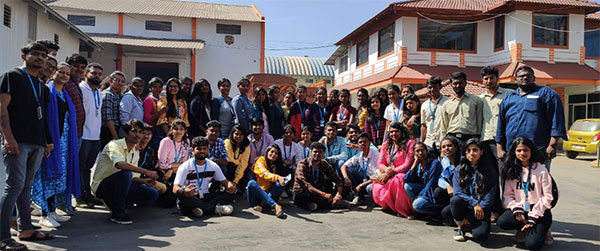
Date: 20 /01/ 2020
Number of beneficiaries: VI Semester BCom D Section -61 Students
Objective: Understand the practical functioning of a manufacturing industry.
Places/Industry Visited: Visit to National Sugar Industries Limited Koppa, Mandya District
NSL Sugars Limited (NSL) is one of the most efficient integrated sugar companies in south India and a sugar arm of ‘NSL’ group. It was established as an associate company of NSL group in the year of 2003-04 with the vision that the real scope for economic activity lies in agro-based Industry in rural India. Today, NSL Sugars is amongst the top ten sugar companies in India. The visit aimed to give a practical exposure on the Methods and Techniques of Cost Accounting.
Students were given a brief introduction about the company and they were taken to the factory to familiarize with the sugar manufacturing process. . First, the students were taken to the section where tons of sugarcane was crushed to extract the juices, the juice is then heated to 70o C, the milk of lime and Sulphur dioxide is added simultaneously for clarification of juice. The clarified juice is filtered and evaporated and sugar is crystallized from it. The last process is where the end product is transferred into packets that accommodate 50 kilos per bag. The entire process usually takes 12 hours to complete a process and the machines run 24 hours a day.
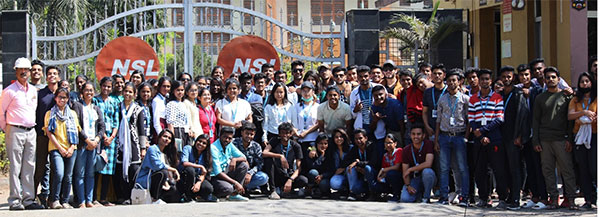
Date: 20/01/2020
Number of beneficiaries: VI Semester B. Com B Section – 46 Students
Objective: To get exposure to the working of sugar industry.
Places/Industry Visited: Visit to National Sugar Industries Limited Madhur, Mysore Road Bangalore.
NSL Sugars Limited (NSL) is one of the most efficient integrated sugar companies in south India and a sugar arm of ‘NSL’ group. It was established as an associate company of NSL group in the year of 2003-04 with the vision that the real scope for economic activity lies in agro-based Industry in rural India. Today, NSL Sugars is amongst the top ten sugar companies in India.
Students were given a brief introduction about the company and they were taken to the factory to familiarize with the sugar manufacturing process. First, they took the students to the blend station where tons of sugarcane was dumped into a transferring station, which was then transferred to a chopping station. Once the sugarcane was chopped, they were taken to the next process where the chopped sugarcane is crushed to extract juice. The extracted juice is then heated and melted to the stage of brown sugar. The brown sugar is again boiled to a point where it turns black in colour. Then, it is transferred into a rotating container, till the color changes to white due to vaporization of the liquid state, where the white sugar is generated. White sugar was shifted to packaging unit, weighing 50 kilos per bag. The entire process would take 12 hours to complete a process and the machines run 24 hours a day. The visit aimed to give a practical exposure on the Methods and Techniques of Cost Accounting.

Date: 04th January 2020
Number of beneficiaries:M II Semester B. Com F Section - 72 students
Places/Industry Visited: National Sugar Industries Limited Madhur, Mysore Road, Bangalore.
Objective of the visit: This activity was carried out in order to provide them an understanding of the Management Process and the manufacturing of sugar in a systematical manner.
NSL Sugars Limited (NSL) is one of the most efficient integrated sugar companies in south India and a sugar arm of ‘NSL’ group. It was established as an associate company of NSL group in the year of 2003-04 with the vision that the real scope for economic activity lies in agro-based Industry in rural India. Today, NSL Sugars is amongst the top ten sugar companies in India.
Students were given a brief introduction about the company and they were taken to the factory to familiarize with the sugar manufacturing process. First, they took the students to the blend station where tons of sugarcane was dumped into a transferring station, which was then transferred to a chopping station. Once the sugarcane was chopped, they were taken to the next process where the chopped sugarcane is crushed to extract juice. The extracted juice is then heated and melted to the stage of brown sugar. The brown sugar is again boiled to a point where it turns black in colour. Then, it is transferred into a rotating container, till the color changes to white due to vaporization of the liquid state, where the white sugar is generated. White sugar was shifted to packaging unit, weighing 50 kilos per bag. The entire process would take 12 hours to complete a process and the machines run 24 hours a day. The visit aimed to give a practical exposure on the Methods and Techniques of Cost Accounting.
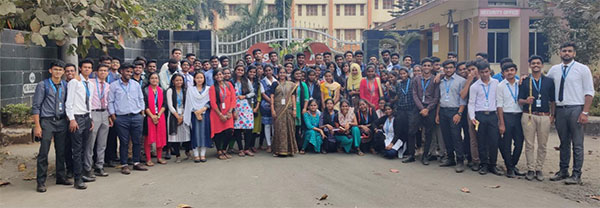
Date: 18/12/19
Class & No. of students: II B. Com P2 Section & 60 Students
Name of the company visited: NSL Sugars Limited.
Name and details of the company: NSL Sugars limited is located in Industrial section of KOPPA 122 from Bengaluru. NSL Sugars Limited (NSL) is one of the most efficient sugar companies in south India and a sugar arm of ‘NSL’ group. NSL Group entered the ‘sugar’ business being related to agro-commercial crop business.
Objective of the visit: This activity was carried out in order to provide them an understanding about how a factory works and how manufacturing of sugar takes place.
Once we reached the factory, the students were briefed about the factory workings and the production process of sugar by Mr. Mahesh, the Supervisor over there. He explained the detailed process of sugar production. Starting with procurement of sugarcane, NSL Sugars Ltd. provides dependable source of farm income to around thousands of families of sugarcane growers and livelihood to about 3000 families by directly involving in plant operations and indirectly 5000 families by involving them in harvesting and transportation of sugarcane. Following this step is leveling of sugarcane which is done using preparatory devices. In these devices, the sugarcane is crushed. Then the crushed sugarcane moves to the mill where salvarizers, shredder, fibrizer are present where the sugarcane is chopped into small pieces, crushed and the juice is extracted. In order to achieve zero level wastage, the dry waste obtained from this process is utilized for power production. The cane juice extracted is processed in a boiling operation at 80oC -100oC which is done using clarifier. Then the output in the form of plasma is boiled and heated under vacuum at 100 degree Celsius in order to absorb all moisture content in it and finally sugar crystals are produced. This crystal is again heated at 120 degree Celsius and milk of lime and sulphur dioxide is added simultaneously in order to get clean white sugar. The by-product molasses are taken to the distillery unit for producing spirit. The final white crystals are packed in a bag of 25kgs and sent to the warehouse. It takes approximately 2 days to get white crystal sugar.
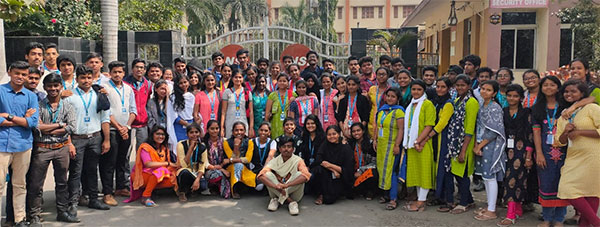
Date: 16/12/2019
Class & No. of students: II B. Com D Section & 59 Students
Name of the company visited: NSL Sugars Limited.
Name and details of the company: NSL Sugars limited is located in Industrial section of KOPPA 122 from Bengaluru. NSL Sugars Limited (NSL) is one of the most efficient sugar companies in south India and a sugar arm of ‘NSL’ group. NSL Group entered the ‘sugar’ business being related to agro-commercial crop business.
Objective of the visit: This activity was carried out in order to provide them an understanding about how manufacturing of sugar takes place and an insight to the Management Process.
Once we reached the factory, the students were briefed about the factory workings and the production process of sugar by Mr. Mahesh, the Supervisor over there. He explained the detailed process of sugar production. Starting with procurement of sugarcane, NSL Sugars Ltd. provides dependable source of farm income to around thousands of families of sugarcane growers and livelihood to about 3000 families by directly involving in plant operations and indirectly 5000 families by involving them in harvesting and transportation of sugarcane. Following this step is leveling of sugarcane which is done using preparatory devices. In these devices, the sugarcane is crushed. Then the crushed sugarcane moves to the mill where salvarizers, shredder, fibrizer are present where the sugarcane is chopped into small pieces, crushed and the juice is extracted. In order to achieve zero level wastage, the dry waste obtained from this process is utilized for power production. The cane juice extracted is processed in a boiling operation at 80oC -100oC which is done using clarifier. Then the output in the form of plasma is boiled and heated under vacuum at 100 degree Celsius in order to absorb all moisture content in it and finally sugar crystals are produced. This crystal is again heated at 120 degree Celsius and milk of lime and sulphur dioxide is added simultaneously in order to get clean white sugar. The by-product molasses are taken to the distillery unit for producing spirit. The final white crystals are packed in a bag of 25kgs and sent to the warehouse. It takes approximately 2 days to get white crystal sugar.

Date: 28/11/19
Class & No. of students: II B. Com E Section & 70 Students.
Name of the company visited: NSL Sugars Limited.
Name and details of the company: NSL Sugars limited is located in Industrial section of KOPPA 122 from Bengaluru. NSL Sugars Limited (NSL) is one of the most efficient sugar companies in south India and a sugar arm of ‘NSL’ group. NSL Group entered the ‘sugar’ business being related to agro-commercial crop business.
Objective of the visit: This activity was carried out in order to provide them an understanding of the Management Process and the manufacturing of sugar in a systematical manner.
The students were briefed about the production process of sugar by Mr. Mahesh, Supervisor. He elaborated the detailed process of sugar production. Starting with procurement of sugarcanes, NSL Sugars Ltd. provides dependable source of farm income to around thousands of families of sugarcane growers and livelihood to about 3000 families by directly involving in plant operations and indirectly 5000 families by involving them in harvesting and transportation of sugarcane. Following this step is levelling of sugarcanes which is done using preparatory devices. In these devices, the sugarcane is crushed. Then the crushed sugarcane moves to the mill where salvarizers, shredder, fabrizer are present where the sugarcanes are chopped into small pieces, crushed and the juice is extracted. In order to achieve zero level wastage, the dry waste obtained from this process is utilized for power production. The cane juice extracted is processed in a boiling operation at 80 C -100 C which is done using clarifier. The output cane in plasma form will now undergo pan boiling, heated under vacuum at 100 degree Celsius so that all the moisture content is absorbed and sugar crystals are produced. This crystal is again heated at 120-degree Celsius and milk of lime and sulphur dioxide is added simultaneously so that the clean white sugar comes out. The by-product molasses are taken to distillery unit for producing spirit. The final white crystals are packed in a bay of 25kgs and sent to warehouse. It takes 2 days to get white crystal sugar.
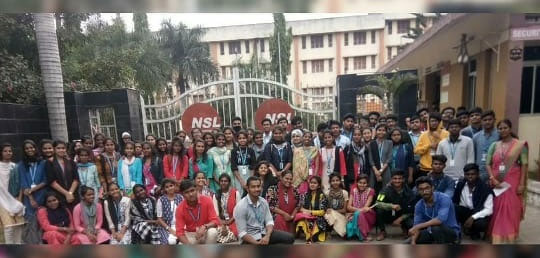
Date: 27/11/19
Class & No. of students: II B. Com C Section - 66 Students
Name of the company visited: NSL Sugars Limited
Name and details of the company: NSL Sugars limited is located in Industrial section of KOPPA 122 from Bengaluru. NSL Sugars Limited (NSL) is one of the most efficient sugar companies in south India and a sugar arm of ‘NSL’ group. NSL Group entered the ‘sugar’ business being related to agro-commercial crop business.
Objective of the visit: This activity was carried out in order to provide the students an understanding of Management Process and the manufacturing of sugar.
Once we reached the factory, the students were briefed about the factory workings and the production process of sugar by Mr. Mahesh, the Supervisor over there. He explained the detailed process of sugar production. Starting with procurement of sugarcane, NSL Sugars Ltd. provides dependable source of farm income to around thousands of families of sugarcane growers and livelihood to about 3000 families by directly involving in plant operations and indirectly 5000 families by involving them in harvesting and transportation of sugarcane. Following this step is leveling of sugarcane which is done using preparatory devices. In these devices, the sugarcane is crushed. Then the crushed sugarcane moves to the mill where salvarizers, shredder, fibrizer are present where the sugarcane is chopped into small pieces, crushed and the juice is extracted. In order to achieve zero level wastage, the dry waste obtained from this process is utilized for power production. The cane juice extracted is processed in a boiling operation at 80oC -100oC which is done using clarifier. Then the output in the form of plasma is boiled and heated under vacuum at 100 degree Celsius in order to absorb all moisture content in it and finally sugar crystals are produced. This crystal is again heated at 120 degree Celsius and milk of lime and sulphur dioxide is added simultaneously in order to get clean white sugar. The by-product molasses are taken to the distillery unit for producing spirit. The final white crystals are packed in a bag of 25kgs and sent to the warehouse. It takes approximately 2 days to get white crystal sugar.
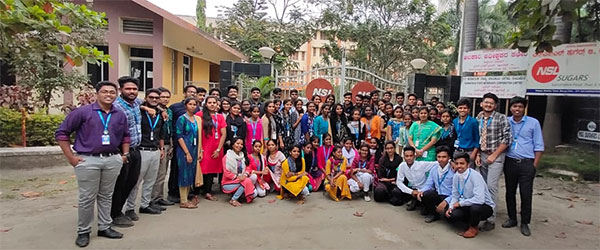
Date: 28/11/2019
Class & No. of students: II B. Com E Section & 70 Students.
Name of the company visited: NSL Sugars Limited.
Name and details of the company: NSL Sugars limited is located in Industrial section of KOPPA 122 from Bengaluru. NSL Sugars Limited (NSL) is one of the most efficient sugar companies in south India and a sugar arm of ‘NSL’ group. NSL Group entered the ‘sugar’ business being related to agro-commercial crop business.
Objective of the visit: This activity was carried out in order to provide them an understanding of the Management Process and the manufacturing of sugar in a systematical manner.
Once we reached the factory, the students were briefed about the factory workings and the production process of sugar by Mr. Mahesh, the Supervisor over there. He explained the detailed process of sugar production. Starting with procurement of sugarcane, NSL Sugars Ltd. provides dependable source of farm income to around thousands of families of sugarcane growers and livelihood to about 3000 families by directly involving in plant operations and indirectly 5000 families by involving them in harvesting and transportation of sugarcane. Following this step is leveling of sugarcane which is done using preparatory devices. In these devices, the sugarcane is crushed. Then the crushed sugarcane moves to the mill where salvarizers, shredder, fibrizer are present where the sugarcane is chopped into small pieces, crushed and the juice is extracted. In order to achieve zero level wastage, the dry waste obtained from this process is utilized for power production. The cane juice extracted is processed in a boiling operation at 80oC -100oC which is done using clarifier. Then the output in the form of plasma is boiled and heated under vacuum at 100 degree Celsius in order to absorb all moisture content in it and finally sugar crystals are produced. This crystal is again heated at 120 degree Celsius and milk of lime and sulphur dioxide is added simultaneously in order to get clean white sugar. The by-product molasses are taken to the distillery unit for producing spirit. The final white crystals are packed in a bag of 25kgs and sent to the warehouse. It takes approximately 2 days to get white crystal sugar.

Date: 26/11/2019
Number of beneficiaries: 70 Students of II B. Com (B-Section)
Name and details of the Industry: NSL Sugar Ltd. Located in Industrial sector of Koppa 122 from Bengaluru.
Objective: The objective of the Industrial visit is to make the students aware of Management Process and the culture being followed with a practical exposure of Industrial environment
Once we reached the factory, the students were briefed about the factory workings and the production process of sugar by Mr. Mahesh, the Supervisor over there. He explained the detailed process of sugar production. Starting with procurement of sugarcane, NSL Sugars Ltd. provides dependable source of farm income to around thousands of families of sugarcane growers and livelihood to about 3000 families by directly involving in plant operations and indirectly 5000 families by involving them in harvesting and transportation of sugarcane. Following this step is leveling of sugarcane which is done using preparatory devices. In these devices, the sugarcane is crushed. Then the crushed sugarcane moves to the mill where salvarizers, shredder, fibrizer are present where the sugarcane is chopped into small pieces, crushed and the juice is extracted. In order to achieve zero level wastage, the dry waste obtained from this process is utilized for power production. The cane juice extracted is processed in a boiling operation at 80oC -100oC which is done using clarifier. Then the output in the form of plasma is boiled and heated under vacuum at 100 degree Celsius in order to absorb all moisture content in it and finally sugar crystals are produced. This crystal is again heated at 120 degree Celsius and milk of lime and sulphur dioxide is added simultaneously in order to get clean white sugar. The by-product molasses are taken to the distillery unit for producing spirit. The final white crystals are packed in a bag of 25kgs and sent to the warehouse. It takes approximately 2 days to get white crystal sugar.
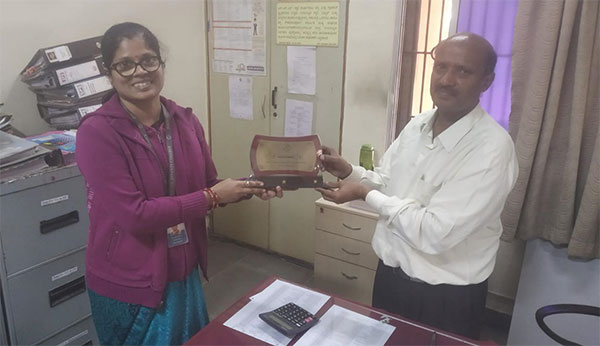
Date: 25/11/2019
Class & No. of students: II B.COM A Section - 70 Students
Name of the company visited: NSL Sugars Limited
Name and details of the company: NSL Sugars Limited (NSL) is one of the most efficient integrated sugar companies in south India and a sugar arm of ‘NSL’ group. NSL Group entered the ‘sugar’ industry as part of their diversified interests in agro-commercial crop business.
NSL Sugars Ltd was established as an associate company of NSL group in the year of 2003-04 with the vision that the real scope for economic activity lies in agro-based Industry in rural India. Today, NSL Sugars is amongst the top ten sugar companies in India with five integrated sugar complexes across Karnataka, Telangana & Maharashtra states producing sugar (27000 TCD), Cogeneration power (152MW), Distillery (280 KLPD) and organic manure products & Bio fertilizer products (300 MTPA).
All plants are located in South India with proximity to air / sea ports to support refining operations during off-season. All these five integrated plants are strategically located with better cane availability prospects, higher yields & recovery rates and relatively easier regulatory environment. This would be an important value/profitability driver for the growth prospects of the company. Strong farmer relationships of the Group are another key lever in the cane development potential of the Company.
Zero waste plants mean that all by-products generated are further processed into saleable products.
Molasses, Bagasse and Press mud, which are the by-products of the sugar manufacturing process, are converted into Ethanol / Rectified Spirit, Power and Organic manure products respectively.
Enabling the socio – economic development of our farmers.
By adopting rigid air pollution control measures, the company has entered into Clean Development Mechanism and Carbon Credit agreement with international organization.
Objective of the visit: To enable the students to observe and learn how manufacturing of sugar takes place in a factory in a systematic manner and get an in-depth understanding of Management Process.
Supervisor Mahesh explained the process of making sugar. He went through a detailed process of making sugar. Beginning with the sugarcane harvest, NSL Sugar Limited provides direct agricultural income to thousands of sugarcane farmers and about 3,000 families, transporting over 5,000 families through plant operations and indirect collections. Following this step is leveling of sugarcane which is done using preparatory devices. In these devices, the sugarcane is crushed. Then the crushed sugarcane moves to the mill where salvarizers, shredder, fibrizer are present where the sugarcane is chopped into small pieces, crushed and the juice is extracted. In order to achieve zero level wastage, the dry waste obtained from this process is utilized for power production. The cane juice extracted is processed in a boiling operation at 80oC -100oC which is done using clarifier. Then the output in the form of plasma is boiled and heated under vacuum at 100 degree Celsius in order to absorb all moisture content in it and finally sugar crystals are produced. This crystal is again heated at 120 degree Celsius and milk of lime and sulphur dioxide is added simultaneously in order to get clean white sugar. The by-product molasses are taken to the distillery unit for producing spirit. The final white crystals are packed in a bag of 25kgs and sent to the warehouse. It takes approximately 2 days to get white crystal sugar.
